
- 9 . 03 . 21
- Career , Career Guests

What Can You Do with a PhD in Communication? (Almost) Anything You Want!
- Posted by: Jennifer Scott, PhD
The crisis of employment for doctorate holders is no longer academia’s dirty little secret.
Even major outlets from Slate to The New York Times report on how the glut of PhDs seeking secure positions in higher ed made the tenure track professoriate the new golden ticket. Both the humanities and hard sciences have hundreds of applications for jobs in R1 schools, community colleges, and every university in-between. For the first time, “alt-ac” career options need to become less an alternative and more of the viable path.
In the sea of uncertainty for so many graduate students, those earning a doctorate in Communication may wonder about their career prospects. They’ve likely already received questions from loved ones, and to be fair, the field is often misunderstood by outsiders.
This ambiguity mixed with the steep odds of joining the professoriate may cause Communication PhDs a lot of stress. What can one possibly do with a degree like this?
Turns out, a lot.
Communication is everywhere
Communication is everything. It is its own field yet holds space in other fields. It’s the very definition of interdisciplinary.
There are communication experts in every industry you could imagine. Communication has its own subgenres such as Health Communication, Science Communication, and Tech Communication, just to name a few. I studied Gender Communication, which examines how we express gender identity and roles through language, body, and behavior. My research borrowed heavily from sexuality, sociology, psychology, and rhetoricism. Many aspects of my study were useful when I became an Editorial Director at a research institute that studied relationships.
And then we can’t forget the formalized industries of Communication that include film and television production, marketing, journalism, and public relations. Even social media management needs a certain degree of understanding about how messages are successfully sent and received by an audience. It’s all communication, and you need a mastery of it to use it well. Such a specialized degree shows hiring teams that’s exactly what you can do.
Is a PhD in Communication valuable?
There’s always a concern that non-academic companies don’t value the terminal degree. Dr. Ed Smallwood, Senior Director, Pricing and Data for Spectrum Reach (Charter Communications), saw the benefits that a PhD brought to the corporate world even if it wasn’t always readily recognizable to others. “I thought the PhD would help me in future career endeavors,” Dr. Smallwood says. “… I’ve been pleasantly surprised in the way many of my colleagues appreciate my experiences and education. Even in introductions, bios, etc., the degree certainly carries an extra level of import.”
While some like Dr. Smallwood found a doctorate in Communication could further their corporate careers, others blazed new trails with a graduate degree as their guide. Just ask Dr. Tiffany Eurich. Before she started her own public relations business, she was a professor earning her doctorate in Communication as a requirement for tenure. “Completing a PhD while teaching full-time, I was constantly refining my time management skills, increasing my discipline for self-motivation, and learning to ‘triage’ my creative ideas,” she says, “all important skills for getting my business off the ground.” She left the Ivory Tower to form Tiffany Eurich Communications , utilizing everything she learned for a competitive edge.
Completing a PhD while teaching full-time, I was constantly refining my time management skills, increasing my discipline for self-motivation, and learning to “triage” my creative ideas, all important skills for getting my business off the ground. Dr. Tiffany Eurich
“Working on my PhD taught me how to absorb, appraise, and distill large amounts of information quickly. In the daily work of running a business, this is essential,” she explains. “Similarly, doctoral training helps me add layers of value to client work, because I’m able to move through data, market research, and new options at a depth and pace that others often don’t provide.”
How to leverage your Communication degree
Graduate students don’t have to wait to see how their education will empower their long-term career goals. If you’re still in the midst of your coursework, you have choices in graduate school that can make you a well-rounded future candidate for non-academic jobs.
Dr. Eurich believes part of her success is that she studied what she was teaching at the time. It allowed her to build her own skillset while helping students as well. Also, her research interests were applicable outside of higher education. She says, “I wanted my knowledge and skillsets to be marketable .”
Likewise, Dr. Smallwood researched impression-based advertising, which coincided with his corporate work. “I’ve been invited to serve on a transformational project regarding impression-based advertising for my company, which has led to senior-level exposure and other opportunities,” he says. Going into your program with a plan minimizes the uncertainty of where to turn when you’re finished.
Also, communication industries thrive on freelancers and project-based experience. As a graduate student, you can pitch articles and manuscripts to media outlets outside of research journals to broaden your portfolio. Work on short-term projects that showcase your skills such as a podcast series, a short film, a limited-run theater production, or a news package. While the degree is impressive, what you can produce speaks volumes.
For those with a degree in hand, looking for a way out of the exploitative cycle of adjuncting, it’s important to use what you’ve been trained to do for a parallel non-academic role. For example, when I was on the job market, I highlighted skills that I learned in graduate school and teaching to fit the responsibilities of the job.
Writing, editing, and researching are valued both in and out of academia. Teaching lends itself to public speaking and presentation experience. Student engagement signals your interpersonal and management skills.
A PhD in Communication is not a magic wand, but it can conjure up the skills and abilities to take you where you want to go. So, think big and broad. Ask yourself what you want and see how the degree can serve those dreams.
PhD Graduates Don’t Need Resumes. They Need a Freaking Vision
I Was a Government Policy Analyst. Here’s What I Learned About PhD Government Jobs
What Can You Do with a PhD? 5 Awesome and Unusual Ways to Build a Living with a Doctorate!
Jennifer Scott, PhD
As a writer and multi-media journalist, Jennifer Scott has produced online content across multiple platforms for more than 20 years. She holds a PhD in Communication, a Master of Arts in Journalism, and a Master of Education degree. With this extensive training, she taught writing, speech, and marketing classes on both the undergraduate and Masters level. Currently, she leads a team of content creators as Editorial Director at The Gottman Institute. She is an innovative thought leader who excels in this diverse, global environment.
Read more on Jen’s work at her website .
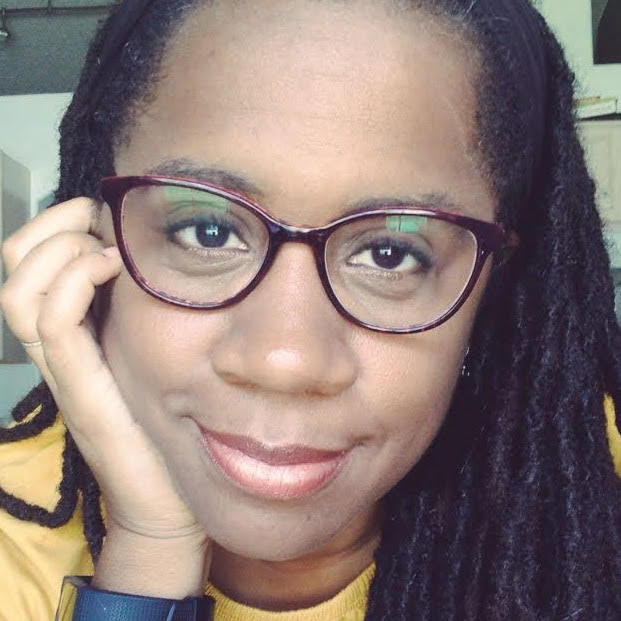
Consulting Secrets 3 – Landing Clients
Photo by Christian Sterk on Unsplash There’s a new type of post buzzing around LinkedIn. I confess, I’ve even made a few. The post is

You’re Not Good Enough… Yet
Last year, I spent $7k on a business coach. She was fantastic. She helped me through sessions of crafting my ideas to become a “thought

$200/hr Expert? Here’s the Secret!
Photo by David Monje on Unsplash I was listening to Tony Robbins this week. He was talking about being the best. Tony asks the audience,
SHARE THIS:
EMAIL UPDATES
Weekly articles, tips, and career advice
Roostervane exists to help you launch a career, find your purpose, and grow your influence
- Write for Us
Terms of Use | Privacy | Affiliate Disclaimer
©2023 All rights reserved
- Skip to primary navigation
- Skip to main content
CollegeRank.net
Best College Rankings
Best PhD Communications Degrees

Quick Highlights:
- Our #1 ranked school for a PhD in communications is Temple University , followed by Purdue University .
- These programs prepare students for advanced careers in academia , research, and various industries.
- Many programs offer interdisciplinary study options , allowing students to combine communications with other fields.
- Graduates are equipped for diverse roles in marketing, government, education, and more.
Communication is one of the broadest areas of study that can lead to numerous well-paid and secure careers, and earning your PhD in this discipline could help you to reach the most coveted roles.
With a PhD in Communications, you’ll be ready to pursue rewarding careers in academia, research, and numerous other fields. Your strong understanding of how meaning is conveyed across different contexts, social groups, and technologies means you could also find great success in marketing careers, government organizations, and many other industries. Let us help you make a decision abut doctoral programs.
- Top PhD in English Programs
- Best Creative Writing MFA Programs
What Are the Best PhD in Communications Degrees?
At CollegeRank , we strive to do our best to guide you and your family toward a fruitful academic career. The pursuit of knowledge is a noble one, and we want to help you reach your goals. Please feel free to visit our dedicated methodology page for a step-by-step breakdown. For questions, comments, badge downloads, or data corrections, please feel free to reach out to us at [email protected].
Whether you are studying communication theories, strategic communications or an interdisciplinary field, there are doctoral programs for you.
Best Communication Doctoral Programs
Temple university.
Philadelphia, Pennsylvania
Average Net Price

Founded in 1884 as a night school for working professionals, Temple University has advanced to become one of the leading institutions in the nation, with around 40,000 students attending annually. Both undergraduate and graduate programs are available at the Philadelphia campus, with a total of around 500 programs offered.
Temple University’s top PhD in media and communication degree program integrates studies in a range of areas, including social sciences and the humanities. This doctoral program will prepare PhD students for careers in education, consulting, finance, and others. In addition to working closely with your peers, PhD students will contribute to faculty research and publications.
Courses and areas of study will cover research areas like:
- Political communication
- Laws and policies relating to the media industry
- Emerging media and technology
- Global media
- Information and communication technologies
- Strategic communication
You’ll also have access to and benefit from guest speakers and events such as Best Practices for Publishing Journal Articles. Temple University was ranked among the 100 Best Values in Public Colleges by Kiplinger’s Personal Finance in 2017.
Purdue University
West Lafayette, Indiana

Ranking highly among the nation’s most innovative universities, Purdue University was founded in 1862 and continues to celebrate its rich history and traditions to this day. Examples include the institution’s on-campus, annual Grand Prix event, in addition to the official song sung by students: “Hail Purdue”.
PhD students may earn a non-thesis or thesis-based master’s degree in addition to their dissertation-based doctorate. This can be in one of five specializations and research areas, including:
- Health communication
- Interpersonal communication
- Organizational communication
- Media technology & society
- Public relations
What’s more, there are opportunities available for cross-discipline study. Purdue’s School of Management allows you to combine your communications program with studies in human resource management. Other options include:
- gerontology
- information security
This highly flexible doctoral program structure allows you to tailor your program to your career aspirations.
Rutgers University
New Brunswick, New Jersey

Rutgers was established in 1766, making it the eighth oldest institution of higher education in the nation, with a study body nearly 70,000-strong. Based at the New Brunswick campus of Rutgers University, the School of Communication and Information (SC&I) was established in 1982. It has one of the top communication doctoral programs.
The top PhD in communication, information, and media at Rutgers University offers three areas of concentration:
- Communication
- Library and information science
- Media studies
The curriculum focuses on information and media organizations and their processes, policies, and technology, in addition to how these organizations and processes relate to society and individuals.
The communication concentration focuses on research connected to five research areas:
- Communication and technology
- Language and social interaction
Faculty members include nationally and internationally recognized experts, many having received article, book, and career awards for their research areas.
Louisiana State University
Baton Rouge, Louisiana

Louisiana State University first opened its doors to students in 1860 under the name Seminary of Learning of the State of Louisiana. Programs are offered at both the graduate and undergraduate levels, and over $300 million in financial aid is given to students each year. In fact, around two-thirds of the student body graduates without student debt.
LSU’s PhD program in communication is offered via the LSU department of communication studies. In addition to the PhD and several master’s degree options, prospective students can enroll in the M.A. to PhD fast track program, which results in both qualifications. Upon acceptance into the doctoral program, PhD students will work with the graduate committee to develop your individualized curriculum.
The standard PhD track comprises 72 credit hours, including examinations and a dissertation; it’ll take around 4 years to complete or 7 years maximum (part-time). Through required core courses, PhD students gain a foundation in subjects such as:
- research writing
- communication theory
- strategic communication
Ohio State University
Columbus, Ohio

Prospective PhD students wishing to attend Ohio State’s doctoral program must already have a four-year bachelor’s degree or equivalent from an accredited institution. You’ll also need to evidence a minimum 3.0 cumulative GPA, in addition to providing transcriptions and evidencing successful completion of the GRE or GMAT.
The coursework you’ll complete in this top communication PhD program focuses on providing a solid foundation in communication theory, in addition to how this existing knowledge can be used to generate new learning through research activity. You will have the opportunity to attend professional conferences, and you will design, plan, execute, and publish your own research findings.
You’ll be mentored by distinguished scholars and guided in creating your own personalized program of study, emphasizing areas where your own interests meet those of the faculty. During your doctoral studies, you will also be encouraged to collaborate with world class faculty members and contribute to both journal articles and papers.
University of Minnesota
Minneapolis, Minnesota

The University of Minnesota has one of the top doctoral programs for communication. It has an annual enrollment of around 50,000 students, supported by 20,000 dedicated staff and faculty. Founded in 1851, the main campus – Twin Cities – is located on the banks of the Mississippi and is one of the only five universities in the country to boast dedicated schools for engineering, medicine, law, and veterinary studies on a single campus.
While this communications PhD program is designed to be completed in five years, you may be able to complete the doctoral program in four years if you hold a master’s degree in communication studies. The PhD curriculum focuses on the connections between each subfield in the discipline of communication.
Your first year of study will focus on foundation knowledge and central concepts and theory in communication. In year two, you’ll take courses related to your specific research interests and write a literature review to a publishable standard. Year three requires completion of the remaining coursework, with your final two years dedicated to dissertation work.
University at Buffalo
Buffalo, New York

Students at the University at Buffalo benefit from a huge range of opportunities outside of the classroom. Student clubs and organizations are vast, with more than 600 available to choose from. There’s also a Division I athletics program, regularly scheduled music concerts and other events, and frequent guest speakers present on a range of topics. UB has one of the best communication doctoral programs.
Coursework in this doctoral program focuses on research methodologies and the theory of communication, with students prepared to take on research-based positions in a range of industries. Unlike other doctoral programs that specialize in areas such as mass communication or speech theory, this curriculum is aligned with the faculty’s research interests.
Graduate students are required to complete a minimum of 36 credit hours of coursework beyond the master’s program curriculum, maintaining a QPA (quality point average) of at least 3.0. You will also be expected to complete research electives, department electives, and free electives, in addition to producing two publication-quality research papers.
University of Illinois at Urbana – Champaign
Champaign, Illinois

Founded in 1867, the University of Illinois Urbana-Champaign today welcomes around 47,000 students annually from around the globe. It has risen to become one of the top 15 ranked public universities and was the birthplace of the first graphical web browser. UIUC also counts 29 Pulitzer Prize winners among its alumni.
The faculty at the University of Illinois’ Institute of Communications Research (ICR) come from three academic departments:
- Advertising
- Media and cinema studies
They’re also engaged with numerous interdisciplinary activities across campus, meaning you’ll receive a broad and well-rounded program of study in this program.
Admission to the PhD in communications and media requires that prospective students have either a bachelor’s or master’s degree that relates to an area within the humanities, physical sciences, or social sciences. The program itself requires the completion of 64 credits of dissertation research and coursework for those who already hold a master’s degree.
University of Oklahoma
Norman, Oklahoma

Students at the University of Oklahoma have a choice of more than 400 clubs and organizations, organized events on-campus, and broad athletic programs. With a campus located close to the welcoming community of Norman, OK, and just a half-hour outside of Oklahoma City, you’ll never be short of activities outside the lecture hall.
This PhD communication program allows specialization in one or more areas of interest. These research areas include:
- Intercultural/international communication
- Interpersonal communication and social influence
- Political/mass communication
- Communication technology
The PhD program requires a minimum of 90 semester hours beyond the bachelor’s degree level.
PhD students enrolling in this program are required to take a number of core courses, in addition to earning 32 hours of coursework within a concentration of their choosing. Core courses include:
- Quantitative Research Methodology
- Advanced Statistics
- Qualitative research methods
- The History and Theory of Communication
- Information and Communication Technologies
- Strategic Communication
Florida State University
Tallahassee, Florida

Florida State University (FSU) has been ranked a top 10 university for best value by Kiplinger’s Best College Values. It’s also known for having the highest four-year graduation rate among the state’s public universities. The institution excels in particular in the arts and sciences.
Including 48 credit hours of graduate coursework and at least 24 hours of dissertation project work, this PhD communication program provides you with a core set of common courses that will provide a broad understanding of the field of communication, and the methodological, philosophical, and theoretical aspects of communication scholarship.
Florida State’s doctoral program offers supervised teaching opportunities, often including teaching at an undergraduate level in communication. You’ll also gain training in essential skills such as classroom management and research skills, which would be invaluable for any future university instructors. Regular workshops are also offered, which focus on innovation in e-learning methods.
North Carolina State University
Raleigh, North Carolina

North Carolina State University at Raleigh (NC State) is part of the University of North Carolina System and was founded in 1887. The student body comprises more than 35,000 learners and the institution specializes in programs in the humanities, social sciences, and teaching and research, making it an excellent choice for communications majors.
NC State’s communication and English department is located within the Research Triangle, a growing community and highly regarded location of innovation and research in Raleigh, North Carolina. In this program, you’ll gain both teaching and research experience, and you’ll benefit from a flexible curriculum of core elective courses and seminars.
The communication, rhetoric, and digital media (CRDM) faculty engages with other research departments and organizations within the Research Triangle, providing a wealth of expertise and experience for you to benefit from. You’ll cover subfields including:
- new communication media
- the cultural, political, and social aspects of information technology
Indiana University – Bloomington
Bloomington, Indiana

Indiana University Bloomington has over 700,000 graduate alumni who have benefited from nearly 400 study abroad programs and more than 750 student organizations. The university participates in 24 sports, with students known as Hoosiers. They also have a choice of more than 200 undergraduate programs and nationally recognized graduate programs.
This PhD in media arts and sciences comprises 90 credits and provides a broad and customizable curriculum that can lead into many varied careers. It’s one of the top research doctoral programs in media and communication, featuring small class sizes and a leading faculty.
As part of the admission requirements, you’ll need to have a four-year bachelor’s and two-year master’s degree with a minimum GPA of 3.5 at the master’s level. You will also need:
- recent GRE scores
- three letters of recommendation
- a statement of purpose
- a writing sample
- a copy of your curriculum vitae
The closest estimate you can get for tuition and fees at Indiana University Bloomington is by looking at the previous year’s expenses. Alternatively, you can get a reasonably accurate idea of your tuition and fees by using the university’s costs calculator on their website .
North Dakota State University
Fargo, North Dakota

Ranked within the top 100 public research universities, North Dakota State University (NDSU) features within the National Science Foundation’s top 100 for numerous areas of study, including the sciences, business, and communications. Accredited by the Higher Learning Commission, the institution has a total enrollment of around 13,000 students.
The NDSU doctoral degree in communication is highly competitive. You’ll enroll in:
- as many as 12 credit hours prior to completing an application
- 60 credit hours beyond master’s level
- 30 credit hours in research theory or other content within your concentration
- 15 hours relating to research methodology
You will also be expected to complete a dissertation (15 credits).
By graduation, doctoral students have typically published two to three papers or journal articles, in addition to having presented at more than one convention. This doctoral program will also give you a solid understanding of learning and teaching, making it ideal for those looking to secure a role as a university instructor.
The University of Alabama
Tuscaloosa, Alabama

The University of Alabama was the state’s flagship university, having been founded nearly 200 years ago in 1831. Situated on a stunning 1,200-acre campus, the university boasts more than 600 student clubs and organizations, plus a broad range of opportunities for volunteering or completing an internship.
PhD students enrolling in the PhD in Communication and Information Sciences can select from one of three signature research areas of the faculty:
- Emergent media
- Sports communication
Alternatively, you can opt to partner directly with members of the faculty, focusing on research activities pursued by these instructors.
What’s more, you can tailor your coursework to specific areas of concentration that include:
- applied communication
- book and publishing studies
- health communication
- interpersonal communication
- media studies
There’s more information about each of these concentrations and their focus on the university’s program page.
The University of Illinois at Chicago
Chicago, Illinois

As a freshman at the University of Illinois at Chicago, you’ll receive an introduction to campus life at orientation, and you’ll need it; located minutes from the Windy City, there’s always plenty to get involved in. More than 33,000 students attend this best value and most diverse university annually.
For admission into the PhD in communication, you must already have a master’s degree in communication or a similar field, in addition to holding an average GPA of 3.0, or 4.0 for your final 60 semester hours. Other requirements include the need to submit GRE general scores and provide three letters of recommendation.
You’ll choose one or more specializations in common subfields of communication, and it’s also recommended that you enroll in two courses in research techniques that are specific to your chosen specialization. After graduation, you can also choose to enroll in further concentrations to complement your degree, including:
- Black studies
- Gender and women’s studies
- Latin American and Latino studies
University of Massachusetts-Amherst
Amherst, Massachusetts

Situated in Amherst, Massachusetts, UMass Amherst is regularly ranked within the top research institutions in the country. It was also recently ranked at number 26 in a list of the best national public universities by U.S. News & World Report . More than 13,000 students attend UMass Amherst annually.
For successful completion of this doctoral program, you’ll be required to complete a minimum of 60 credits beyond the bachelor’s level, in addition to a further 6 or more credits in research tools or methodologies. You will also be expected to plan, research, and complete a dissertation project of your own choosing.
This communication studies doctoral program offers a particularly large number of specializations to choose from—14 in total—which include unique specializations such as feminist studies and performance studies. For more information on the potential specialization options, check out this page on the university’s website.
The per-credit rate for tuition and fees at the University of Massachusetts Amherst depends on the number of credits being taken. For example, a single credit is only marginally cheaper than two credits, as the rates work on a sliding scale. Non-residents typically pay around twice what state residents will pay.
Michigan State University
East Lansing, Michigan

Michigan State University has been welcoming students through its doors for more than 160 years. Ranked as a top public U.S. university, top 100 global university and receiving a gold sustainability rating, MSU produces highly competent graduates who have a 93% placement rate, almost 12% higher than the national average.
According to the program page, this doctoral degree in communication is considered one of the most prestigious programs of its kind in the world. Designed to last for four years, the PhD program requires the completion of a dissertation and regularly sees graduates offered roles in research centers, government organizations, and higher education institutions across the globe.
After completion of the core courses, doctoral students typically specialize in:
- social media
- social influence and persuasion
- communication analytics
- organizational communication
Alternatively, you can also choose to specialize in hospitality research and hospitality program teaching.
George Mason University
Fairfax, Virginia

Founded in 1972, George Mason University is a private research institution that has fast become a respected university within the state of Virginia. The student body hails from 130 different countries and totals around 37,000 students. Around $150 million in research takes place each year and 80% of graduates find employment within 6 months of graduation.
While a master’s degree in a related field is a prerequisite for this program, it means that you can graduate with the doctorate after successful completion of just 60 credits. Otherwise, the PhD program comprises 90 credits and involves the completion of a dissertation research project.
You’ll work alongside faculty members to develop essential research relating to health and strategic communication. You’ll study:
- the consumer-provider relationship
- crisis communication
The program-specific requirements for this PhD include:
- submission of college transcripts
- an updated resume
- three recommendation letters
University of New Mexico
Albuquerque, New Mexico
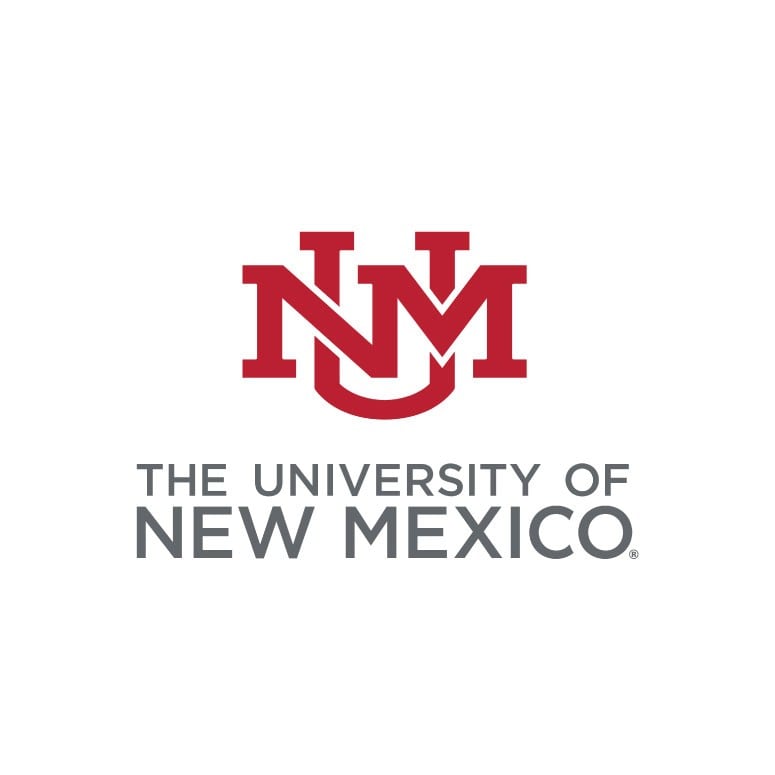
Founded in 1889, The University of New Mexico offers more than 90 undergraduate degree programs and is within the top 20 for two of its programs. Over $70 million in scholarships were awarded to students in the recent incoming freshman year, for which you may qualify after completing the FAFSA .
This PhD program applies the study of communication and culture, and how the two interrelate. Specifically, you’ll look at media studies, health communication, and critical intercultural studies. You’ll complete coursework such as Strategic Communication and Research Methodologies totaling 36 hours, in addition to committing a further 18 hours for your dissertation project.
Upon acceptance into the program, the world-class faculty will help you to design a program of study that closely relates to your aspirations and interests. Faculty members include award-winning instructors whose work has been recognized on both the national and international stage, so you’ll be guided well throughout your program.
University of Colorado Boulder
Boulder, Colorado

Part of the Association of American Universities (AAU), the University of Colorado Boulder was established in 1876 and has since grown to include its own natural history and art museums. Among its alumni are three U.S. Supreme Court justices, five Nobel Prize winners, and five National Medal of Science winners.
This PhD program has been designed to follow a master’s degree, preferably within the same discipline. Assuming that you have completed a master’s within a related area, you could complete this doctoral degree in as few as 3 to 4 years.
Through this doctoral program, you’ll gain a broad understanding of four subject areas. You’ll gain:
- a broad foundation in communication
- develop advanced knowledge of a specific specialization area and one primary research methodology
- expertise in a secondary specialization
University of North Dakota
Grand Forks, North Dakota

The University of North Dakota was founded in 1883, which was six years prior to the state of North Dakota being established itself. Sitting on a 521-acre campus, the institution has more than 250 student clubs and organizations, welcomes around 13,600 students annually, and is the largest university in North Dakota.
Comprising 90 credit hours and taking an average of 3 to 5 years to complete, this communication doctoral degree is led by a faculty with expertise in:
- interpersonal and persuasive communication
- risk and crisis communication
- communication across digital channels including social media
As part of your application, you will be expected to submit your GRE general scores. You will also need to provide a statement of goals that outlines your motivations and career aspirations, in addition to submitting an original academic paper of around 10 to 15 pages in length.
Wayne State University
Detroit, Michigan

Wayne State University heavily emphasizes diversity and inclusion among its students, or Wayne State Warriors. Multiculturalism is encouraged, with students representing more than 75 countries around the world. In fact, this university has the most diverse student body of any other institution in Michigan.
This PhD program offers specialization in five areas:
- Democratic participation & culture
- Identity & representation
- Media, society, & culture
- Risk, crisis, & conflict
- Wellness, worklife, & relationships
You will choose either one or two areas of specialization in which to focus more of your studies and research activity.
Throughout this doctoral program, PhD students are required to complete a minimum of 30 credits of PhD coursework; at least two-thirds of these must be gained from the department of communication. And you’ll need to maintain a minimum GPA of 3.0 to successfully graduate from your program.
University of Oregon
Eugene, Oregon

Situated a short distance from the Cascade Mountains and situated in the Willamette Valley, the University of Oregon comprises 9 schools and colleges and welcomes around 22,500 students annually. A third of freshmen are first-generation college students, holding an average GPA of around 3.65.
When you enroll in this PhD communication program, you’ll work directly with the faculty as a co-author and teacher, contributing your own research alongside recognized names in the communications and media industry. Under the guidance of this R1 research institution, you’ll have expert instruction in areas like:
- global media
- journalism studies
- technology and society
This is also a fully funded research degree, meaning the institution will take care of your tuition. You’ll be funded for four consecutive years of study. Funded students receive a monthly stipend varying between $1,400 and $1,575. As part of this benefit, you’ll contribute 16 hours per week towards teaching and research activities.
New York University
New York City, New York

Founded in 1831, New York University (NYU) welcomes students from almost every state in the nation and more than 130 countries worldwide. The institution has campuses in both Shanghai and Abu Dhabi, in addition to 11 other study-abroad sites across the globe. In total, NYU has more students studying abroad than any other university in the United States.
This heavily technology-driven doctoral program will prepare you for leadership or academic careers in the areas of research, education, and technology. You’ll employ the use of multimedia learning scenarios and conduct research into the learning processes that relate to groups and individuals that work with these environments.
Available as a part-time or full-time program, and comprising 57 credits, this program features coursework in the areas of learning sciences and cognitive sciences. PhD students have the opportunity to work closely with preeminent scholars in this discipline, while conducting their own, original research on how technology is employed for learning purposes.
University of Pennsylvania

Founded in 1740, the University of Pennsylvania employs a faculty nearly 5,000-strong, which helps keep class sizes low; there’s a 6:1 student-faculty ratio. Students participate in everything from clubs and organizations, to Greek society, and a student government. Penn State is also a member of the Ivy League, with many athletic pursuits available.
According to the university’s website, the Annenberg School for Communication has been ranked for the nation’s best doctoral program due to a world-class faculty and well-designed curriculum that allows for highly individualized study. Many PhD graduates are already known nationally or internationally upon graduation.
This communication research degree program lasts for five years and will require you to take introductory courses in both statistics and research methods, in addition to completing the core courses. You’ll need to complete a dissertation proposal and comprehensive examinations in order to progress to the dissertation phase.
Drexel University

Drexel University is among the nation’s largest private institutions with a student body of around 25,000 learners. Comprising a 74-acre main campus, the university is located in a bustling urban city and has numerous other campuses and partnerships elsewhere. Drexel was founded in the 1890s, but began conferring degrees in 1914.
This PhD in communication, culture, and media covers key subject areas that include:
- social justice problems
- the media’s treatment of immigrants
- political communication with a focus on war and conflict
Every admitted student takes the same five core courses, in addition to at least five courses within culture and communications.
The remainder of your doctoral studies will comprise 10 courses geared towards your research needs and unique interests, in addition to having an option to take graduate courses offered outside of the department. You’ll also complete a dissertation and independent research and study to make up the remainder of your 90 required credits.
Howard University
Washington, D.C.

Howard University comprises 13 schools and colleges and was founded in 1867. Students choose from programs in over 120 disciplines, with over 120,000 degrees in the arts, sciences, and humanities having been conferred to-date. As a student based on-campus, you’ll be studying on a campus that’s set in scenic natural beauty atop a hill in Northwest Washington.
Howard University’s PhD in communication, culture, and media studies (CCMS) has a curriculum that’s centered around the emergence of communication issues in a developing multicultural and digital world. Key areas of study include competency in research methodologies and the advancement of under-served communities through social justice and multiculturalism.
As a Howard PhD student, your studies will be focused in one of three specialization tracks:
- Media and cultural studies
- Technology, policy, and society
There are also teaching assistantship opportunities available, which you can make an application for once you have been admitted to this communication, culture, and media studies program.
University of Southern California
Los Angeles, California

The University of Southern California (USC), a leading private research university, is known for producing a high caliber of graduates. There were more than 310 National Merit Scholars in the 2020 freshman class, and the average GPA for incoming students is around 3.70-4.00.
Graduates from this program are thoroughly prepared for and commonly pursue careers as university instructors. Your program will see you conduct your own, original research that advances the field of communications and contributes to the ongoing success of media and governmental organizations in the public and private sector.
PhD candidates choose from seven tracks of specialization:
- Rhetoric, politics, and publics
- Media, culture, and community
- Health communication and social dynamics
- Groups, organizations, and network
- Information, political economy, and entertainment
- Political economy of global communication
- New media and technology
Columbia University in the City of New York

Columbia University was founded in 1754, making it the oldest higher education institution in the state of New York. The student body comprises around 40,000 learners of varying levels, with students participating in a broad variety of athletics and arts programs. And unlike many other universities, each club has its own webpage so you can find what interests you ahead of time.
This PhD program in communications examines the relationships between society and the media from a cultural, political, historical, technological, and social point of view. Doctoral graduates will be expected to evidence their understanding of the broad field of communications overall, while gaining a more in-depth understanding of a specific concentration area.
You’ll produce a dissertation that comprises your own original research, and you will defend your research in front of the graduate committee. Each academic year, you will also be expected to submit progress toward your dissertation to your faculty advisers, after which they will discuss and approve the work for continuation.
Stanford University
Stanford, California

Opened in 1891, Stanford University has a total enrollment of around 16,000 students annually. Its central campus is located in the San Francisco Bay Area and the university today comprises seven schools.
The core focus of Stanford’s communication program is on communication processes, including how they were conceived and their impact on psychology, politics, and culture. PhD candidates typically share research interests in one of three key faculty specializations:
- Media psychology
- Journalism, media, and culture
Most PhD students choose one area of emphasis from the above, while studying the other research areas at a high level. Core courses focus on areas such as:
- qualitative and quantitative research methods
- mass communication theory
Throughout your communication studies, you will develop a research specialization, including the development of research projects and time spent teaching, culminating in an examination.
Frequently Asked Questions
Yes, a PhD in communications can open many doors for your career. You can work in research or academic settings, in advertising or business, and in sociological settings, to name a few. And with a terminal degree, you can likely earn the highest salary in your field. A degree like this offers other benefits, too: you’ll have a high-level set of skills, a detailed understanding of the principles of communication, and you’ll have the resources you need to be an effective communicator whether you’re writing or speaking. It’s a field with good growth potential, too – 8 percent or more, according to the Bureau of Labor Statistics, depending on the specific field in which you work.
The average cost of a PhD is $106,860, according to the Education Data Initiative. The cost of your communications PhD program depends on many factors, including the length of the program, the school you attend, and your residency status. The amount of financial assistance you get also affects the cost of your PhD. With grants, teaching assistantships, or both, you can significantly reduce the overall cost of your degree.
It’s common for universities to require a high GPA (e.g., 3.0 or higher on a 4.0 scale) for your previous college coursework, official transcripts from the universities you’ve attended in the past, and multiple letters of recommendation from professional colleagues or previous professors. It’s also standard for PhD programs in communication to require a personal statement, essay, curriculum vitae, resume, or some combination thereof. In top communication PhD programs , you are typically asked to participate in an admissions interview in person or online.
Communications is not considered a difficult field of study, at least not compared to other areas that require a lot of math and science. However, any PhD program comes with some difficulty, considering the level of study. You will explore complex topics like global media, speech theory, and strategic communications. You will also be required to conduct original research and write a dissertation, which you must defend before your degree is conferred. Be prepared for a lot of work over the course of several years.
A PhD in communications typically takes about five years to complete, including a master’s degree along the way. If you already have a master’s degree, you can likely complete a PhD program in three or four years. The exact amount of time you need to complete your PhD in communications depends in large part on how many courses you take each semester and whether or not you already have a master’s degree.
Yes. Many communications PhD programs accept students with just a bachelor’s degree. In some cases, you will earn a master’s degree as you progress toward your PhD. In other cases, there is no master’s component; you graduate with just a PhD.
A popular career with a PhD in communications is to work as a college professor. Doing so allows you to teach and conduct research on communication topics of interest to you. Other popular choices with a PhD in communications include the following: • Art director • Editor • Graphic designer • Interpreter or translator • Photographer • Reporter • Technical writer • Author
You can earn around $80,840 per year as a PhD-level communications professor, according to the Bureau of Labor Statistics. Starting wages are lower at about $47,000 per year. But as you gain experience and tenure, your salary can eclipse $170,000 per year. Other options and their median annual wages are as follows: • Technical writer ($79,960) • Editor ($73,080) • Interpreter or translator ($53,640) • Graphic designer ($57,990) • Writers and authors ($73,150) Your salary depends on many factors beyond your specific occupation. You stand to make more money as you gain experience. The same is true if you complete additional training, specializations, or certifications after you complete your PhD.
FellowshipBard
Phd in communications: requirements, salary, jobs, & career growth, what is phd in communications.
A PhD in Communications is a doctoral degree program that focuses on communication theory, research methods, and applications in a variety of fields, including media, journalism, public relations, advertising, organizational communication, political communication, and interpersonal communication.
It is a higher level of education that educates students to become communication academics and researchers.
A PhD in Communications normally entails coursework, independent research, and dissertation completion.
Communication theories, research methodologies, media and society, communication ethics, communication technologies, and strategic communication may all be included in the courses.
Students may also be able to specialize in a specific field of communications based on their research interests.
How much money do people make with a PhD in Communications?
PhDs in Communications can expect to earn attractive incomes, particularly if they work in academia, research organizations, or other specialized industries.
According to BLS data, the median annual wage for postsecondary communication and media studies lecturers, which often includes those with PhDs in Communications working in academia, was $69,170 in 2020.
Postsecondary instructors’ pay, on the other hand, might vary greatly based on the type of school (e.g., public vs. private), level (e.g., assistant professor vs. full professor), and years of experience.
Salaries for those with a PhD in Communications might vary substantially in various industries, such as research institutions, government agencies, or commercial enterprises, depending on the nature of the work, level of competence, and location.
Communication professionals in leadership or specialized jobs may make more money, especially if they have experience and competence in areas like as strategic communication, media management, or digital communication.
What is expected job growth with PhD in Communications?
Individuals with a PhD in Communications have a generally optimistic work outlook, with opportunities for advancement in a variety of fields.
Job growth in academia, a major career path for those with a PhD in Communications, is often driven by factors such as student enrollment, research funding, and institutional finances.
According to the U.S. Bureau of Labor Statistics (BLS), employment of postsecondary teachers, particularly communication and media studies teachers, is expected to expand 9% between 2020 and 2030, faster than the national average.
However, tenure-track positions in academia are competitive, and opportunities vary by institution and location.
Job growth for individuals with a PhD in Communications may be influenced by factors such as technological advancements, changes in the media landscape, and evolving communication practices in fields other than academia, such as research institutions, government agencies, think tanks, private organizations, and consulting firms.
For example, when the demand for expertise in strategic communication, digital media, or data-driven communication strategies grows, individuals with a PhD in Communications may have more chances in these areas.
Furthermore, as the communication field continues to expand and integrate into various industries and sectors, individuals with a PhD in Communications may find opportunities in non-traditional communication roles such as marketing, advertising, public relations, corporate communication, and social media management, among others.
What can you do with a PhD in Communications?
Graduates with a PhD in Communications can work in academia, research institutions, government agencies, think tanks, corporate companies, consulting businesses, and other sectors. Individuals with a PhD in Communications may pursue the following careers:
1. Professor/Researcher: Many PhDs in Communications pursue professions in academia as professors or researchers. They can teach and do research in communication departments at universities and colleges, as well as write academic articles and books and contribute to the growth of communication knowledge. They may also supervise research projects, mentor students, and attend academic conferences.
2. Research Scientist: PhD in Communications graduates can work as research scientists in research institutes, think tanks, or government agencies. They have the ability to undertake study on communication theories, media effects, audience analysis, communication technologies, and other pertinent areas. Their study findings could help shape legislation, influence communication tactics, or enhance the area of communications.
3. Communication Consultant: Individuals with a PhD in Communications can work as consultants, advising organizations, corporations, or government agencies on strategic communication. They may assist in the development of communication plans, the implementation of communication audits, the analysis of communication practices, and the recommendation of solutions to improve communication effectiveness and meet organizational goals.
4. Communication Strategist: PhD in Communications graduates can work as communication strategists in a variety of sectors, including advertising, public relations, marketing, and social media management. They are capable of developing and implementing communication campaigns, doing market research, analyzing customer behavior, and employing communication methods to reach organizational goals.
5. Policy Analysts: With a PhD in Communications, you can work as a policy analyst, assessing communication policies and their impact on society, organizations, or individuals. They may work in government, non-profit, or think tanks, providing insights and recommendations on communication-related laws, legislation, and practices.
6. Leadership Roles: PhD in Communications graduates can pursue leadership positions in communication-related industries such as chief communication officer (CCO), director of communications, or communication manager. In organizations, they may lead communication teams, establish communication strategy, manage communication activities, and monitor communication initiatives.
7. Independent Researcher/Entrepreneur: Individuals with a PhD in Communications may choose to work as independent researchers or entrepreneurs, conducting their own research, writing books, providing specialized training or consulting services, or developing innovative communication products or technologies.
What are the requirements for a PhD in Communications?
The specific requirements for obtaining a PhD in Communications can vary depending on the institution and program, but generally, the following are common requirements:
1. Bachelor’s or Master’s Degree: Applicants to most PhD programs in Communications must have a Bachelor’s degree from a recognized university. Although it is not usually required, certain schools may accept applicants with a Master’s degree in a related discipline.
2. Academic Transcripts: Applicants are usually expected to present certified transcripts of their undergraduate and graduate education, which demonstrate their academic performance and achievement.
3. Statement of Purpose: Applicants are typically expected to provide a personal statement or statement of purpose detailing their research interests, academic ambitions, and reason for pursuing a PhD in Communications.
4. Standardized Test Scores: Applicants to many PhD programs may be required to submit scores from standardized tests such as the Graduate Record Examination (GRE) or other related assessments.
5. Letters of Recommendation: Applicants to PhD programs in Communications are frequently required to provide letters of recommendation from academic or professional sources who may speak to the applicant’s academic talents, research potential, and eligibility for a PhD program.
Looking For Scholarship Programs? Click here
How long does it take to get a phd in communications.
The length of a PhD program in Communications varies by country, university, and individual circumstances. A PhD program in Communications can take 4 to 6 years to finish on average, although it might take longer depending on the research requirements and development of the individual student.
Looking For Fully Funded PhD Programs? Click Here
Do you need a masters in communications to get a phd in communications.
A Master’s degree in Communications is not always required to enroll in a PhD program in Communications. It may, however, differ based on the university or program requirements.
Some PhD programs in Communications may prefer or require applicants to have a Master’s degree in a similar discipline, but others may accept students with only a Bachelor’s degree.
What are the Best PhD in Communications Degree programs?
1. university of pennsylvania – annenberg school for communication 2. stanford university – department of communication 3. university of texas at austin – moody college of communication 4. university of illinois at urbana-champaign – college of media 5. university of michigan – department of communication studies 6. university of california, santa barbara – department of communication 7. northwestern university – school of communication 8. university of southern california – annenberg school for communication and journalism 9. indiana university – media school 10. university of wisconsin-madison – school of journalism and mass communication, leave a comment cancel reply.
Save my name, email, and website in this browser for the next time I comment.

Professors Not Responding? Your CV May Be the Reason.
Try Our Ready-to-Use CV Templates Land You in Harvard, MIT, Oxford, and Beyond!
Theory and Research Ph.D.
Main navigation.
The Ph.D. program prepares students to conduct original research on communication processes, their origins, and their psychological, political and cultural effects. Most of our doctoral graduates enter academic teaching and research careers, or communication-related professions that require research skills.
Students usually enter the program with strong interests in one of our three areas of special strength: Media Psychology , Political Communication , or Journalism, Media and Culture . Within the program, students tend to anchor in one area while exploring key empirical and theoretical concerns in the others. After a core curriculum of courses in quantitative and qualitative methods, statistics, and mass communication theory, each student builds a research specialization through advanced courses and seminars in Communication and related departments, research projects, teaching, and an examination in the area of concentration. These requirements are normally completed within four years, and the dissertation within six.
Ph.D. Requirements and Procedures
American Speech-Language-Hearing Association
- Certification
- Publications
- Continuing Education
- Practice Management
- Audiologists
- Speech-Language Pathologists
- Academic & Faculty
- Audiology & SLP Assistants
Considering and Pursuing a PhD in Communication Sciences and Disorders
When thinking about pursuing a PhD, you're likely to have many questions. How difficult is it? Will it put me further into debt? What are my career options when I graduate? Earning a PhD may seem daunting, but it's more achievable than you think.
A PhD program focuses on developing an area of research expertise and prepares a person for a career as a professor, researcher, or administrator—often in an academic setting. The job outlook for faculty in communication sciences and disorders (CSD) is positive, with a high demand for both new and experienced faculty in the discipline.
On this page:
The Benefits of a PhD
Myths about the phd, key considerations, choosing a phd program, applying to a phd program, completing a phd program.
With a PhD, you can have a significant impact on the CSD discipline by doing the following:
- Conducting research to increase our understanding of communication disorders
- Training the next generation of clinicians and researchers; and
- Contributing your subject matter expertise as an advocate, leader, and/or consultant.
Individuals with a PhD have a multitude of career opportunities , including the following:
- Teaching and carrying out research at a university;
- Writing scholarly articles and presenting research at conferences;
- Developing clinical research programs; and
- Directing rehabilitation programs.
The majority of people who earn a PhD in CSD pursue faculty-researcher careers within a college or university. CSD programs often prefer to hire faculty with PhDs because of their research expertise in a specific area and their ability to teach and mentor students. The job market is excellent for individuals with PhDs: Findings from the annual CSD Education Survey consistently demonstrate strong demand for new academic faculty.
Myth #1: I can't afford a PhD.
REALITY: A much higher percentage of PhD applicants are offered admission with funding support compared to master's speech-language pathology and AuD applicants. These funding opportunities can include the following:
- Scholarships, which generally don't require work in exchange for funding;
- Fellowships, which may or may not require work; and
- Assistantships, which require research and teaching work that often directly relates to the skills you need to succeed as a faculty-researcher.
Myth #2: The PhD program is much harder than a clinical graduate program.
REALITY: PhD coursework covers many of the same topics as a clinical master's or clinical doctorate program—but at an advanced level. PhD students also must take statistics and research courses as well as do independent research. But, don't worry! Many students enter a PhD program without statistics or research training. You'll work with your advisor to develop your program based on your research interests, previous education, and experiences.
Myth #3: Admission is too competitive.
REALITY: Although the pool of applicants for PhD programs is often quite competitive, it's a much smaller group compared with clinical graduate programs. Acceptance into a PhD program may depend more on finding a good match between the interest areas of an applicant and a mentor's research area than competition between applicants.
Myth #4: I can't complete clinical hours for certification during the PhD program.
REALITY: Yes, you can! Many programs are flexible and offer options for doing a Clinical Fellowship (CF) or completing Audiology clinical hours during the PhD program. Be sure to check with potential programs to see if this is a possibility.
Myth #5: I'll have no life as a professor because of the workload.
REALITY: Faculty members can achieve a good work–life balance and enjoy the following benefits:
- A flexible schedule, within the confines of teaching and lab responsibilities
- Optional summers off, depending on the job requirements
- Freedom to pursue other teaching, research, and service interests within the structure of the university or college guidelines
Is a PhD right for me?
Part of knowing if a PhD is the right fit for you means knowing how it differs from other CSD graduate degrees.
- The research doctorate (e.g., PhD) degree focuses on developing an area of research expertise and prepares a person for a career as a professor, researcher, or administrator.
- Entry-level clinical degrees prepare you for a clinical career as follows:
- The master's degree in speech-language pathology (e.g., MA, MS) is the degree required for you to practice as a speech-language pathologist.
- The clinical doctorate in audiology (AuD) is the degree required for you to practice as an audiologist.
- The clinical doctorate in speech-language pathology (e.g., SLPD, CScD) prepares you for a career as a master clinician, supervisor, or administrator, with a focus on one specific area of clinical expertise.
- The doctor of education (EdD) degree prepares you for either an administrative career or a research career, depending on the program's training focus.
Do I need a PhD in CSD to obtain a faculty position in a CSD department? No. People with PhDs in other fields may teach CSD courses that are specific to their area of expertise, such as phonetics, psycholinguistics, psychoacoustics, speech and hearing science, and other nonclinical courses. However, these people typically aren't qualified to teach disorders courses or graduate-level clinical courses—those are typically taught by professionals with a CSD background.
Do CSD faculty members need to have a clinical degree and ASHA certification?
Most CSD faculty members have a clinical degree and an ASHA Certificate of Clinical Competence (CCC). However, you do not need clinical certification to be a faculty-researcher in a CSD program. Here are some advantages to obtaining a clinical degree and certification:
- Makes you eligible for academic positions that include clinical supervision and teaching
- Enables you to direct a clinical program.
- Gives you greater insight if you plan to pursue clinical practice research
- Enables you to supervise graduate students so that they can receive clinical hours while working and completing research in your lab
Some academic positions, particularly at research extensive institutions, do not require clinical certification.
This table [PDF] presents the different pathways for integrating clinical training into research training—and the pros/cons of each.
When choosing a PhD degree program, your primary goal is to find a faculty mentor who conducts research in your area of interest.
Task 1: Identify your research topic.
Start by identifying a topic that fascinates and inspires you. You may spend years or your entire career exploring the topic, so it's important to choose something that will continue to challenge and interest you:
- Select topics that are timely and relevant—such as those topics that you anticipate will receive increased funding and interest in the coming years. Avoid topics with too many current researchers competing for limited funds.
- Many topics offer the possibility of interdisciplinary work, which could expand your choices for jobs and funding opportunities.
- Keep in mind that the topic doesn’t have to be specific; it can change as long as it makes sense for your academic goals.
Task 2: Identify potential mentors.
You can take several steps to identify potential mentors:
- Conduct a literature search to identify researchers who frequently publish on the topic. Look for a person with an established line of research and a solid history of publications.
- Attend presentations on your topic at the ASHA Convention and at smaller conferences. Poster sessions offer you the opportunity to talk directly with researchers. Ask questions about the research and show your enthusiasm about the topic. Explore whether the researcher has space to take on a new student. If one of their mentored students is presenting, get the student's perspective on opportunities for working with the faculty member.
- Explore faculty webpages to review their research areas, grant funding, recent publications, research labs they run, courses they teach, and their curriculum vitae (CV) to evaluate whether they're actively pursuing research and teaching in your area of interest.
- Talk to your professors and supervisors. Faculty members working on similar research topics often know about their colleagues' current work. You can also ask them about the faculty member's personality and mentoring style.
Task 3: Contact potential mentors.
After identifying potential mentors, you should contact each person before applying to the doctoral programs at their institution. You don't want to find the perfect mentor and then find out, after applying to their program, that they are not accepting new students. When reaching out, keep in mind that you're not just looking for someone who will guide your research. A good mentor needs to be someone who works well with you and who will guide your doctoral program in many ways, including building skills in teaching, grant writing, and manuscript writing.
Make initial contact by telephone or email. You can also network with faculty in person at the annual ASHA Convention. Before you contact a faculty member, remember to visit the faculty member's web page and read some of their research publications. Introduce yourself by saying that you're in the initial stages of gathering information about doctoral programs, and you're particularly interested in the faculty member's line of research. It may be helpful to ask for an informational interview either by phone or video conference to get a better understanding of the faculty member’s communication style, responsiveness, and future directions in research.
Task 4: Explore the doctoral program offerings.
First, identify the requirements of the doctoral program, including the following aspects:
- Testing (e.g., comprehensive exams after completing coursework)
- The dissertation process
Second, identify available opportunities, which may include the following:
- Courses offered within the department as well as courses in related fields.
- Research resources, such as labs and access to possible participants.
- Opportunities for developing your own research interests.
- Teaching, which may be required as part of an assistantship (if this isn't the case, you might want to pursue whether teaching opportunities are available).
- Strong doctoral preparation in multiple areas—this gives you more flexibility if you change your focus or hope to collaborate.
- Collaborative and interdisciplinary programs across different departments, such as cognitive science, neuroscience, and applied linguistics.
Third, reach out to current doctoral students in the program to learn more about the following:
- Program requirements and expectations
- Department culture
- Levels of faculty support
- Funding experiences
- Overall program satisfaction
Task 5: Determine funding sources.
Most doctoral students finance their doctoral education through funding from the university that they attend, often resulting in far less debt than students in clinical graduate programs. Students may receive funding through different sources, including those listed below:
- Fellowships from the university (with or without work requirements).
- Research or teaching assistantships that require work.
- Training grants funded by external sources (e.g., National Institutes of Health, U. S. Department of Education).
- Funding from private foundations (e.g., American Speech-Language-Hearing Foundation ).
Universities typically provide tuition as a benefit from fellowships or assistantships, such as tuition remission or in-state tuition for courses.
Universities may guarantee funding for the entire doctoral program or determine funding yearly.
Basic Requirements for Applications
Application requirements typically include the following:
- A bachelor's degree in CSD or a related field, although some programs may prefer a graduate clinical degree.
- A minimum grade point average (GPA) of 3.00, although the average GPA for admission is likely much higher.
- An official copy of Graduate Record Examination (GRE) scores.
- A writing sample or essay.
- Letters of recommendation.
Other possible requirements include a CV or résumé and/or a personal interview.
Competitive Applicants
Applicants for PhD programs tend to be top-performing students and, as such, have competitive GPA and GRE scores. Aside from top scores, however, you can find other ways to be a competitive applicant, especially with regard to the writing sample or essay.
- If the institution provides explicit guidelines for the writing sample on the application, follow these guidelines carefully.
- When less guidance is provided, consider focusing on the following questions:
- Why are you interested in entering a PhD program? That is, are you interested in an academic-research career?
- What are your areas of interest?
- What background do you have in research?
- What academic and personal skills will help you succeed in a research doctoral program?
- Show that you've researched your area of interest and have a general command of the topic.
- Describe what makes you a strong candidate, and state your long-term career goals.
- Proofread grammar and spelling carefully. Your writing mechanics will be evaluated because of the importance of writing skills in your career. If English is your second language, take advantage of resources for ensuring that your writing follows proper English grammar and accepted spelling rules.
Having prior research experience is an advantage, but it is typically not required when applying to a PhD program. It's a plus if you completed a thesis in your clinical master's or AuD program because it will be good preparation for the dissertation, and it shows your potential mentor that you can successfully complete a long-term research project. Having authored or co-authored a peer-reviewed journal article is a definite advantage for preparing you to write scholarly articles.
Don't let your lack of experience in research discourage you from pursuing the PhD. Most research doctoral programs have well-delineated research experiences that prepare the doctoral student for the dissertation phase of their program.
Acceptance Into a PhD Program
The CSD Education Survey reports yearly data on the number of applications and number of applicants offered admission to PhD programs. Realize that if you don't get accepted into a program, it may have less to do with your qualifications and more to do with other factors. For example:
- You may be an excellent candidate, but the university or the department doesn't have sufficient funds to support you.
- The advisor you wish to work with doesn't have the availability to mentor another student.
- The advisor's research focus may differ from your proposed area of interest, or another applicant may have more experience in that area.
Program Structure
Most students finish the PhD program in 4–6 years, depending on an individual's rate of progress through the program (based on factors such as previous coursework, family considerations, or combined degree programs). In general, the academic plan for the PhD allows for more choice and creativity in coursework selection than clinical graduate programs. The four main components to the PhD program include the following:
- Research training experiences
- Comprehensive exams
- The dissertation
Your advisor will guide you in forming a committee that will evaluate your comprehensive exam(s) and oversee the dissertation process.
Coursework requirements for the PhD can range from 50 to 90 credits (typically taking 2-3 years) but vary depending on specific credit requirements (e.g., academic vs. research credits, transfer credits).
Research Training Experiences
Research training experiences typically involve working in the mentor's research lab along with other graduate students. Work progresses from the mentor's established research projects to independent research projects expanding on the mentor's research.
Comprehensive Examination
Students take the comprehensive examination once they complete the required coursework and research experiences. The examination is designed to establish the student's proficiency and expertise in their selected area of study. The specific nature of the examination process, however, varies across institutions:
- Comprehensive exams may be written, oral, or both.
- Students usually work with their dissertation committee to develop topics and content.
After successfully completing the comprehensive exam, the student advances to doctoral candidacy.
Dissertation
The dissertation is an independent, original research study focused on a critical question within the discipline. Students typically take at least 1 year to complete it under the mentor's guidance. Satisfactory completion includes an oral defense to a committee of typically five faculty members.
Contact us at [email protected] with further questions about pursuing the PhD degree.
In This Section
- Learn About the Professions
- Planning Your Education
- Financial Aid
- Advertising Disclaimer
- Advertise with us
ASHA Corporate Partners
- Become A Corporate Partner

The American Speech-Language-Hearing Association (ASHA) is the national professional, scientific, and credentialing association for 234,000 members, certificate holders, and affiliates who are audiologists; speech-language pathologists; speech, language, and hearing scientists; audiology and speech-language pathology assistants; and students.
- All ASHA Websites
- Work at ASHA
- Marketing Solutions
Information For
Get involved.
- ASHA Community
- Become a Mentor
- Become a Volunteer
- Special Interest Groups (SIGs)
Connect With ASHA
American Speech-Language-Hearing Association 2200 Research Blvd., Rockville, MD 20850 Members: 800-498-2071 Non-Member: 800-638-8255
MORE WAYS TO CONNECT
Media Resources
- Press Queries
Site Help | A–Z Topic Index | Privacy Statement | Terms of Use © 1997- American Speech-Language-Hearing Association
Ph.D. in Communication and Communication Studies Degree Programs
Updated: june 27, 2024.
At its heart, communication is the study of the human communication process. It is a process that is being constantly reshaped with technological advancements (e.g. internet, social media). That transformation has wide ranging effects not only on how humans consume, analyze, and interpret messages from different media sources, but also how they interact with each other.
Communication is a multidisciplinary field of study, one that attempts to understand human communication process and its relationship to social, cultural, economic, and political institutions and practices. Through instruction in research methodologies and communication theory, the Ph.D. in Communication teaches students to analyze the complex interactions between those institutions – whether the news media or government. With that skill set and knowledge, graduates are prepared to pursue careers in academia as professors and researchers, but also leadership positions throughout communications, in areas such as journalism, public relations, corporate communications, or advertising.
Classification of Communication Doctoral Programs
Through doctoral studies, students in communications programs develop a comprehensive understanding of the foundational principles of communication and its processes, institutions, and research methodologies. This grounding prepares students to pursue careers in academia, conduct independent research, or move into the private sector in the communication industry. Typically, communication programs are offered by schools and departments of communication or journalism. Example programs include the following:
- American University
- Columbia University
- Northwestern University
- The Ohio State University
- University of Colorado Boulder
- University of Massachusetts-Amherst
- University of Southern California
The field of communications has distinct academic elements, each with its own theories, research methodologies, and applications. Common discipline specializations include the following:
- Communication theory
- Cultural studies
- Feminist studies
- Film studies
- Global communication
- Intercultural communication
- Language and social interaction
- Media effects
- Political communication
- Popular culture
- Rhetoric and public discourse
Admissions Information for Ph.D. in Communication Programs
Applicants to doctoral programs in communication are generally encouraged to have a master’s degree or be in the process of completing a master’s degree in communication or a related field, such as journalism. Students should also note that many Ph.D. programs require students to have completed a thesis as part of their master’s program for admission.
However, there are Ph.D. programs in communication that accept students who hold a bachelor’s degree, but not a master’s degree. Unlike traditional programs requiring a master’s degree, M.A./Ph.D. options are not as common. Students admitted to the M.A./Ph.D. program usually start their studies with a masters-level academic plan that includes coursework students would have completed in a master’s in communication program. Once they complete their core classes, students sit for a qualifying examination to gain admission to the Ph.D. program. If they do not pass the examination, students exit the program and graduate with a master’s degree in communication.
Although specific admissions criteria vary by program, most programs share the following requirements:
- Statement of purpose/interest
- Letters of recommendation (usually two to three letters)
- Academic writing sample
- Official GRE scores (generally no older than five years)
- Official transcripts
- Minimum GPA (typically 3.0 for undergraduate work and 3.5 for master’s-level work)
- CV or resume
- IELT or TOEFL scores, if international
Curriculum Details for Ph.D. in Communication Programs
In a communication Ph.D. program, curriculum is split between required core classes, academic concentration coursework, outside electives, and a dissertation. Communication is a broad, interdisciplinary field that combines the study of the social sciences, humanities, media, journalism, the arts, and related disciplines such as technology. Through lecture- and seminar- classes, these programs introduce students to the foundational theories of communication, research methodologies, and academic literature, and their connection to fields such as rhetoric, politics, and media studies. Researchers and scholars in the field may explore how technology is reshaping the modern media system or examine religion’s relationship to political discourse in the United States.
In the first year of study, students are introduced to communication studies at the doctoral level, including a review of the disciplines central theories and concepts. The initial three-to-six classes in the core curriculum orient students to Ph.D. scholarship and prepare them to conduct independent research by teaching them how to conduct literature reviews, ask incisive research questions, and establish methodological designs.
Although classes vary by institution, students typically complete coursework in quantitative and qualitative research methods, scientific approaches to communication, and communication theory (e.g. media or rhetoric). After honing their knowledge of research methodologies and theoretical practice, students transition into a second-year program that includes degree concentration and elective classes. This coursework is specific to the student’s specific research interests, such as media and culture, health communication, or political and public discourse. By the end of the second year, students should have gained an advanced level of competence in their research specialization.
Upon completing their core curriculum and academic concentration coursework, students will form their doctoral dissertation committee and begin their qualifying examinations. Qualifying examinations, both written and oral, typically must be passed for the student to transition into doctoral candidacy to research and write their dissertation. After successfully passing their qualifying examinations, students spend the final year or more developing and defending a dissertation prospectus, conducting independent research, and finally writing and defending their dissertation.
The list below describes a range of sample courses students may take while enrolled in a Ph.D. in Communication program:
- Quantitative Research Methods in Communication : An introduction to the practices of qualitative research, exploring topics such as discourse analysis, historiography, and ethnography.
- Classical Rhetorical Theory : An exploration of rhetorical theory from antiquity through the fifth century, spanning the works of Plato to St. Augustine.
- New Technology Media : A high-level overview of how the rise of digital media, in particular the internet, has reshaped communication, covering related subjects such as virtual spaces and artificial intelligence.
- Feminist Theory in Communication : The study of broad topics in feminist theories in communication, covering areas such as technology and science, the workplace, language, and feminist critiques of media and film.
- Media and Politics : A discussion of the relationship between politics in the United States and mass media, considering subjects such as social media and modern election campaigns, digital media use in political reporting, and the convergence of media and political issues.
Typically, the Ph.D. in Communication is designed for students to graduate after three- to four-years of full-time study. However, most graduate programs allow for a timeline extension, which is–generally–up to eight years of study at the institution. Reasons for extending the time to graduation vary by student, as some may take a break to start a family, while others may take longer to complete additional research for their dissertation, or to have the opportunity to publish their research in academic journals. Students who enter an M.A./Ph.D. program can expect closer to five to six years to complete their program.
To earn their Ph.D. in Communication, students usually must complete 80 to 90 total credit hours of study, including their dissertation and master’s degree credits. In most cases, programs that require a master’s degree for admission allow students to transfer and apply up to approximately 30 credits of their master’s degree to their doctoral graduation requirements. For example, in a three-year program, the first year is spent completing core curriculum. Year two is dedicated to finishing electives and academic concentration classwork, and preparing for and taking qualification examinations, and writing a dissertation prospectus. The final year is spent in research, writing, and defending the dissertation.
The table below serves as an example for how a four-year communication Ph.D. curriculum plan might be structured for a student entering with a master’s degree. Due to the unique nature of doctoral study, curriculum plans vary based on the student, the institution, the plan of study, and the academic concentration. Additionally, most students require more than one year to research and write their dissertation. The following table should be used only for example purposes.
Preliminary Examinations for a Ph.D. in Communication Studies
After finishing their required core coursework, students must pass preliminary examinations to be admitted into candidacy for the doctorate degree and to work on their dissertation. Although specific requirements vary by institution, the two common testing formats are written and oral examinations.
The written and oral examinations cover the student’s understanding of methodology and theoretical core classes, their dissertation research area, as well as related courses in the student’s plan of study. In most cases, the examinations are scheduled when the student’s graduate course work is finished, which is usually either at the end of their second or third year of study.
Master’s in Communication Versus Ph.D. in Communication Programs
The Ph.D. in communication and master’s degree in communication share curriculum similarities, but are different programs in their structure, program objectives, and career outcomes. At the master’s level, there are two common curricula tracks: applied and theoretical. Applied master’s programs in communications are generally geared towards professionals seeking to advance their careers through additional training in communication theories, strategic communication, research, analytics, and written, verbal and visual communication. . The applied option is typically designed for individuals who do not wish to pursue a Ph.D. in communication after earning their master’s degree.
In addition, there are theory- and research-based master’s in communication degree programs designed for students who do plan to pursue a doctorate in communication following graduation. Generally, these programs include additional coursework in communication theory and research methodologies, writing, and literature analysis. While some specializations in communication are inherently more applied, for example, strategic communication or public relations and marketing communication, master’s in communication studies programs typically follow a more theoretical and research-based curriculum.
However, both types of programs traditionally share similar core curriculum, including the study of the principles and practices of communication, professional writing and editing, qualitative and quantitative research methods, message creation, and strategic persuasion techniques. The applied communication track then focuses on developing the student’s skills in critical thinking, writing and presentation, leadership, and interpersonal communication that can be used across the communication industry, including journalism, new media, marketing, public relations, digital media, healthcare, entertainment, and more. While the theoretical track emphasizes the student’s mastery of research skills, preparing them for future study at the doctoral level.
At the doctoral level, the Ph.D. in Communication is traditionally focused on graduating students with the research skills and knowledge required to conduct independent academic scholarship in the field of communication. Beyond careers in academic settings, the Ph.D. program also can prepare students for leadership roles throughout the communications industry, in journalism, advertising and marketing, corporate communications, government and nonprofit, and more.
The curriculum in a Ph.D. in Communication revolves around a specialized, unique program of study. The core curriculum introduces students to the fundamental theories of communication, as well as qualitative and quantitative research methodologies, and strategic communication approaches used by scholars practicing in the field. This study of the core theories and concepts of communication allows students to understand how to read and interpret academic literature, prepare research design methodologies, and write at the doctoral level.
Continuing from their master’s research interests, doctorate students construct their own approach to research methodologies and use it to produce original thought in specific areas of communication. These subjects can broadly cover any diverse number of research areas, such as science and environmental communication, media, society, and politics, organizational communication, health communication, or intercultural communication. For example, students may examine how the relationship between digital technology and media is altering society’s decision-making ability, or how environmental communication impacts public policy surrounding conservation projects.
Before settling on a communication program, prospective students should review the curriculum structure, faculty, and research areas to decide which option best aligns with their academic needs and professional ambitions.
Career Paths for Graduates with a Ph.D. in Communication
The majority of Ph.D. students in communication enter tenure-track career paths in academia following graduation. However, graduates may also pursue employment opportunities in communication industries, applying their knowledge and skill sets in areas such as politics, market research, media and public relations, polling and surveys, and more.
Individuals with a Ph.D. in communication can pursue career avenues outside of higher education, in journalism, advertising and marketing, public relations, entertainment, digital media, web publishing, and more. Below is a sample list of careers within and outside of academia that are open to individuals with a Ph.D. in communication:
- Professor : In colleges and universities, tenure-track professors advance scholarship in communication by teaching classes to undergraduate and graduate students, conducting independent research, writing articles, papers, and books, attending conferences, serving on committees, and more.
- Community College Professor : Instead of research, the primary responsibility for a community college professor is teaching, helping develop course curricula in communication, assisting with learning assessments, and serving on university committees.
- Director of Public Policy : Typically working in nonprofit and education organizations, the director of public policy develops and establishes government relations strategies to further the interests of the organization through legislation and government policies.
- Director of Communications : A director of communications manages an organization’s internal and external communication plans and activities, coordinates media messaging, develops media relationships, and creates targeted communication strategies based on audience or market segmentation.
2024 Best Online PhD in Communications Programs
If you’re interested in the relay of information, including through digital media and mass communication, then pursuing a PhD in Communications online program may be the right path for you.

Earning your doctoral degree in communications can provide you with the opportunity to work in a variety of fields.
Editorial Listing ShortCode:
Communications experts play an important role in managing the communication of information from one person, group, or organization to another.
Universities Offering Online PhD in Communications Degree Programs
Methodology: The following school list is in alphabetical order. To be included, a college or university must be regionally accredited and offer degree programs online or in a hybrid format.
American University
American University offers an online Doctor of Philosophy in Communications program. The program is designed to be completed in 3 years by providing courses for 11 months a year. A total of 54 credits are needed to graduate. Applicants must submit 2 letters of recommendation, a resume, GRE scores, and a master’s thesis.
American University is accredited by the Middle States Association of Colleges and Secondary Schools.
Clemson University
Clemson University offers a PhD program in Rhetorics, Communication, and Information Design.
Students need to complete 30 credits hours and 6 credit hours of research to defend a dissertation. Exams and the defense of the dissertation must be completed on campus. Applicants must have a GPA of 3.5 or higher and a portfolio of past graduate work.
Clemson University is accredited by the Southern Association of Colleges and Schools Commission on Colleges.
Colorado State University
Colorado State University offers a PhD in Communications. Students may choose courses in the following fields: Rhetoric and Civic Engagement, Relational and Organizational Communication, or Film and Media Studies. Applicants must complete 81 credits to graduate. Applicants need 3 letters of reference and a resume to apply.
Colorado State is accredited by The Higher Learning Commission, a Commission of the North Central Association of Schools and Colleges.
Indiana University of Pennsylvania
Indiana University of Pennsylvania offers a PhD in Media and Communication Studies. A total of 60 credits are needed to graduate, with 12 hours used for a dissertation. Students must maintain a GPA of 3.0 or higher to graduate. Applicants must submit official transcripts and 2 letters of recommendation when applying.
The Indiana University of Pennsylvania is accredited by the Middle States Commission on Higher Education.
Liberty University
Liberty University offers an online PhD in Communications program. Students must complete 60 credit hours and may apply to transfer in up to half of the credits required. Courses are 8 weeks long. Applicants must have a GPA of 3.0 and need to submit official transcripts to be eligible for the program.
Liberty University is accredited by the Southern Association of Colleges and Schools Commission on Colleges.
Regent University
Regent University offers a PhD in Communications. The program can be completed online, though a week-long residency in Virginia Beach during the summer is required. Students must complete a minimum of 56 credit hours to graduate.
Applicants must submit official transcripts and a past graduate program academic paper and need to complete an academic background questionnaire. Regent University is accredited by the Southern Association of Colleges and Schools Commission on Colleges.
Robert Morris University
Robert Morris University offers an online PhD in Information Systems and Communications program. Students must complete 60 credit hours, with 12 dedicated to writing a dissertation. At the end of each school year, students must finish a milestone.
Applicants must have a GPA of 3.0 and submit 3 letters of recommendation. An interview with the program director and admissions committee is also required.
Robert Morris University is accredited by the Middle States Commission on Higher Education.
Texas Tech University
Texas Tech University offers a Doctor of Philosophy in Technical Communication and Rhetoric. Applicants must submit 3 letters of recommendation, a writing sample, and transcripts from previous college work.
Students must complete at least 72 hours to graduate from the program. They also have the option to add one of five areas of emphasis to their degree, including Technical Communication and Rhetoric of Science and Healthcare. Texas Tech University is accredited by the Southern Association of Colleges and Schools Commission on Colleges.
University of Alabama
The University of Alabama offers a Doctorate in Communications and Information Sciences. Students may choose to add a concentration in one of seven different areas, including Media Processes and Effects and Books and Publishing Studies.
To be eligible for the program, applicants must have a GPA of 3.0 or higher and submit 3 academic references and their transcripts.
The University of Alabama is accredited by the Southern Association of Colleges and Schools Commission on Colleges.
University of North Dakota
The University of North Dakota offers a PhD in Communication. The program can typically be completed in 5 years and requires 90 credit hours.
To be eligible for the program, applicants must either have a master’s degree in communications or a GPA of 3.0 or higher from their undergraduate studies. GRE scores and 3 letters of recommendation must be submitted when applying.
The University of North Dakota is accredited by the Higher Learning Commission of the North Central Association of Colleges and Schools.
Online PhD in Communications Programs

Online PhD in Communications programs can help you develop your expertise in areas of public relations, mass communication, digital and social media, and journalism.
Common careers in this field include:
- Teacher or professor
- Chief communications officer
- Director of public relations
- Public relations manager
- News media correspondent
- Technical writer
Becoming a teacher within a postsecondary school is a common career path for graduates of a communications PhD program. As a postsecondary teacher, you may develop course curriculum, instruct students on various communication topics, and evaluate student performance through assessments, tests, and other measures.
There are a number of other career options outside of academia that you may also qualify for. Some graduates advance their careers as public relations specialists or managers.
Working in the area of public relations may require drafting press releases and communicating with the media on a regular basis. PR professionals help businesses manage public relations crises and maintain their reputation or public image.
Specific course curriculum can vary depending on the school and program that you choose to attend. Here are some topics, though, that are commonly covered in a communications program:
- History of communication
- Communication theories
- Digital media and mass communication
- Communication in politics
- Media and the environment
- Research methods
- Professional writing
In most cases, PhD communication programs require you to complete coursework as well as a research project in the form of a dissertation.
Communications Careers & Salaries
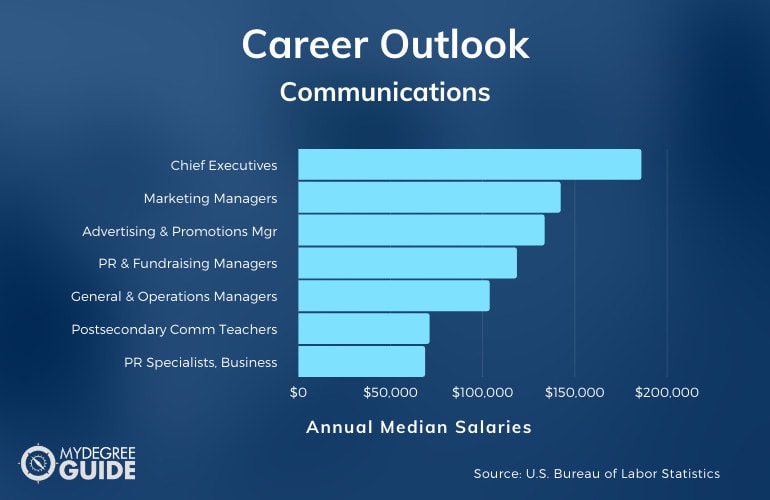
Earning an online PhD in Communications can help you qualify for a variety of advanced positions. Leadership and management positions can include chief communications officer or director of public relations.
PhD graduates tend to teach at postsecondary schools, pursue academic research, or embark on rewarding careers in finance, law, policy development, nonprofit organizations, or government agencies.
According to the Bureau of Labor Statistics , positions in the field of communications are far-reaching and can span across various areas and industries. One of these professional areas includes media, such as journalism, news correspondence, or broadcasting.
| Chief Executives | $185,950 |
| Marketing Managers | $142,170 |
| Advertising and Promotions Managers | $133,460 |
| Public Relations and Fundraising Managers | $118,430 |
| General and Operations Managers | $103,650 |
| Postsecondary Communications Teachers | $71,030 |
| Public Relations Specialists, Business, Political, and Similar Organizations | $68,610 |
| Public Relations Specialists, Government | $67,590 |
| Writers and Authors | $67,120 |
| Public Relations Specialists, Advertising, PR, and Related Services | $64,880 |
The Bureau of Labor Statistics projects that a number of positions in the communication field will experience positive job growth in the next ten years. These positions include top executives (4% job growth), marketing managers (7%), public relations specialists (7%), and postsecondary teachers (9%).
Communications Doctorate Curriculum

Courses in doctoral communications programs can provide you with advanced knowledge in areas related to public relations, digital media, mass communication, media studies, and research. Courses may include:
- Communication Research Methodologies : This course is an in-depth look at standard methodologies used in research in the field of communications and the arts and social sciences more generally.
- Quantitative Research in Communication : You’ll review quantitative research practices in social science, including the use of statistics.
- Qualitative Research in Communication : This course is an overview of qualitative research methods in communication, including interviewing techniques, observation, and the use of focus groups.
- Advanced Communication Theory : You’ll take a look at key theories in the field of communication, including scholars, existing research, and emerging trends and theories.
- History of Communication : This course is an analysis of communication throughout history, including a look at recent changes in technology and the impact that those changes have had on communication.
- Writing for Publication : You’ll examine the approaches used in writing for publication, including conference papers, chapter books, academic papers, and more.
- Social, Mobile, and Online Media Analytics : You’ll look at various social, mobile, and media tools available, along with the metrics, analytics, and big data related to each that help explain the experience of end-users.
- Social Media Strategy : This course is an overview of various digital channels that exist in the realm of communications studies and media, and you’ll learn about leveraging those channels to persuade and interact with an audience.
- Content Communication : This course is a review of content communication strategies used in the pursuit of delivering a message to a target audience and capturing the intended result.
- Analytics in Digital and Strategic Communication : You’ll look at how research in communication has evolved over time, including the increased use of digital analytics.
In addition to regular coursework, you may be required to complete a dissertation, thesis, or research project option as part of your degree program.
Admissions Requirements

In order to enroll in one of the available communication doctoral programs, you may be required to meet a number of admissions requirements. Criteria can vary from one school to the next, but here are a few common requirements:
- Bachelor’s degree . It’s necessary to hold a bachelor’s degree from an accredited school and to submit your official transcripts.
- GRE or GMAT scores . Although this requirement is becoming less common, some schools still require the submission GRE or GMAT scores.
- Letters of reference . Delivery of one or more letters of reference from academic or professional supervisors and colleagues is often requested.
- Resume . You may need to submit a copy of your resume, detailing your academic and workplace experience.
Additional admissions criteria can include completing a written essay, submitting an online application, and completing a writing test.
Accreditation

Regional accreditation is a status that verifies that a postsecondary school and its programming meet a specific set of academic quality standards.
Attending a regionally accredited school can impact your ability to transfer credits to another program or join various professional associations. The accreditation status of the school you choose to attend can also influence the hiring decisions of potential employers.
You can visit the US Department of Education ’s website to find out the accreditation status of a particular school or program.
Financial Aid and Scholarships

There are a number of financial aid and scholarship opportunities that may help you fund your doctorate in communication. Financial aid is available to qualifying students in the form of grants and loans from federal and state governments.
Another option is employer training programs. If you’re currently employed, you can check to see if you’re eligible to receive educational funding from your employer through professional development or employee training programs.
In many cases, postsecondary schools also offer funding to PhD students. While funding amounts and options can vary from one school to the next, some examples include tuition rebates or cost of living stipends. For more information regarding financial aid, you can visit the US Department of Education ’s website.
Communications Professional Organizations

Joining a professional association or organization for communications professionals can provide you with the opportunity to network with others in your field. Professional organizations may also highlight new employment opportunities.
Some communications professional organizations include:
- American Advertising Federation (AAF)
- International Association of Business Communicators (IABC)
- Public Relations Society of America (PRSA)
Professional organizations can also be a great resource for learning and networking if you’re interested in starting your own business.
Is Communications a Good Career?

A career in communications may allow you to explore positions in education, finance, law, policy development, nonprofit, or government.
While it is common for graduates of a PhD in Communications program to pursue positions in teaching, a number of other career options are available. These include positions in public relations, management, research, and media.
The Bureau of Labor Statistics forecasts that a number of positions in the field of communications will experience growth over the next several years. These positions include top executives (4% job growth), marketing managers (7%), public relations specialists (7%), and postsecondary teachers (9%).
What Can You Do with a PhD in Communications?

According to the Bureau of Labor Statistics, earning your PhD in Communications online may allow you the opportunity to work in a variety of positions. Public relations, media, and education are just some of the industries where your communications skills are applicable.
Common careers in this field include chief communications officer, marketing manager, advertising and promotions manager, public relations manager, postsecondary school teacher, and public relations specialist. Other career options include writer, author, reporter, correspondent, and broadcast news analyst.
How Long Does It Take to Get a PhD in Communications Online?
Completing a PhD in Communications online may take 3 to 5 years when attending on a full-time basis.
Depending on the school you choose to attend, you may be able to enroll on a part-time basis, which could lengthen the amount of time it takes for you to obtain your degree. Some online communications programs offer shorter 8 week terms that may allow you to finish your coursework sooner.
Similar to most masters in communications programs , it is common for communications PhD programs to be theory- and research-intensive. A large portion of academic time can be absorbed by work on a dissertation, which is generally required in order to graduate.
What’s the Difference Between Marketing vs. Communications?
While there are some overlapping areas of study between communications and marketing, there are also a few key differences.
Careers in marketing and communications can have some overlapping options, such as advertising, promotions, and marketing managers.
Is a PhD in Communications Worth It?

Yes, a PhD in Communications is worth it for many students. Pursing a terminal degree in communications can allow you to explore topics related to history, writing, research, and social media.
Common careers in this field include marketing manager, advertising and promotions manager, public relations manager, public relations specialist, writer, author, reporter, and broadcast news analyst. PhD graduates often pursue research or postsecondary teacher positions.
Getting Your PhD in Communications Online

A Ph.D. in Communications can help equip you to pursue career paths in education, research, leadership, public relations, or media communications.
A doctoral degree may allow you to benefit from a flexible career path. There may be a variety of opportunities available to you in many different industries, such as government, nonprofit, finance, law, academia, or news media.
If you’re wanting to advance in this highly versatile and lucrative field, you can start today by exploring online communications doctoral programs from accredited universities.

What are you looking for?
- School Leadership
- Diversity and Inclusion
- USC Annenberg Magazine
- Commencement
- Undergraduate Majors
- Master's Programs
- PhD Program
- Graduate Applicants
- Undergraduate Applicants
- Connect and Visit
- Tuition and Financial Aid
- Faculty and Staff Resources
- Advisement and Academic Services
- International Programs
- Career Development
- Progressive Degrees
- Organizations
- USC Annenberg’s Media Center
- Student Work
- Master's Programs
- Faculty Recognition
- USC Annenberg's Media Center
Communication (PhD)
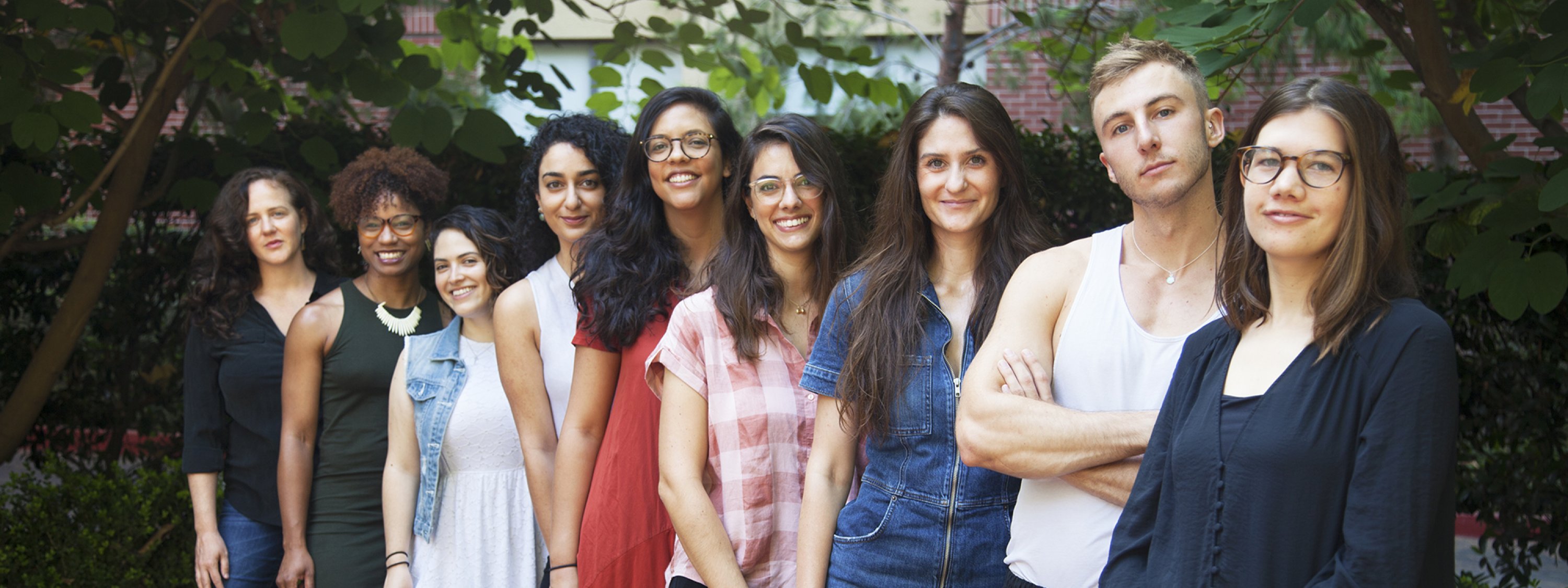
You will acquire the leading-edge theory and research methodologies you need to shape a more ethical and just world.
Whether you seek a career in academia, the industry, or governmental and non-governmental organizations, you will become a critical educator and researcher of communication through rigorous coursework, independent and collaborative research projects, and teaching opportunities.
You will work side by side with your peers and our distinguished faculty to advance knowledge in the field while creating interdisciplinary solutions to complex societal and organizational problems. At the same time, you will build a professional network of worldwide and lifelong connections with fellow scholars and practitioners.
USC Annenberg’s location at the heart of a top-tier research university and in the dynamic city of Los Angeles provides you with the ideal setting to explore ways to inventively fuse your scholarship and expertise in communication studies with disciplines such as political science, international relations, sociology and information sciences as well as gender, media and popular culture studies.
Program Information
- Learning Objectives
- Research and Teaching
- Areas of Study
- Current Doctoral Students
- Class Profile
By the numbers
Student and faculty work.

Changing the world through better communication
Former U.S. Navy Blue Angels team member Amber Lynn Scott became interested in studying high-reliability organizations for her dissertation to make a positive impact for military and first responders.
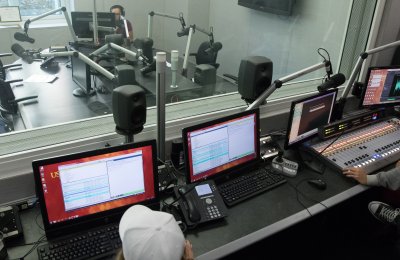
Requiem for a meme
Alexandria Arrieta researches how the intersection of memes and music are having a profound impact on people’s communication and connection across social media.
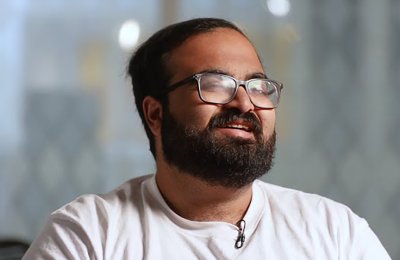
Making social media a better tool for political activism
With his lifelong interest in politics, Alfonso Hedge realized Annenberg’s doctoral program would be the perfect place to study how grassroots political organizations use social media.

From music to AI
Event promoter and DJ Stephen Yang examines the on-the-ground practices of technologists and media professionals as they reshape the culture of production.
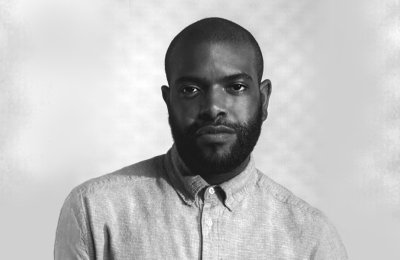
Jermaine Anthony Richards named 2023 Paul & Daisy Soros Fellow
The merit-based program provides funding for Richards to explore his research on how transmedia storytelling animates human security politics, security cultures, and political movements.
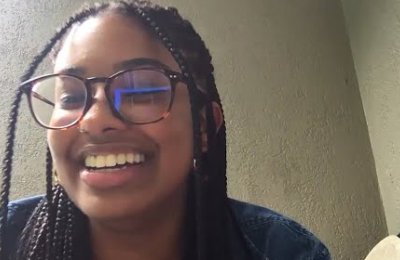
Exploring identity through social media
Samah Sadig shares her passion for identity, expression and education — and how it all brought her to USC Annenberg.
Work on groundbreaking research with expert faculty
As innovations in information and communication technologies continue at a rapid pace, USC Annenberg remains at the forefront of efforts to explore these social, cultural, rhetorical and organizational processes. You will work and collaborate with fellow doctoral students, our world-class faculty, and industry and public/private sector professionals to advance research and insights across a wide range of interdisciplinary areas of study. You will also have the opportunity to lead research endeavors that impact scholarship and practice across the contemporary communications landscape.
Explore the research of USC Annenberg faculty and students. View the areas of study available to our PhD students.
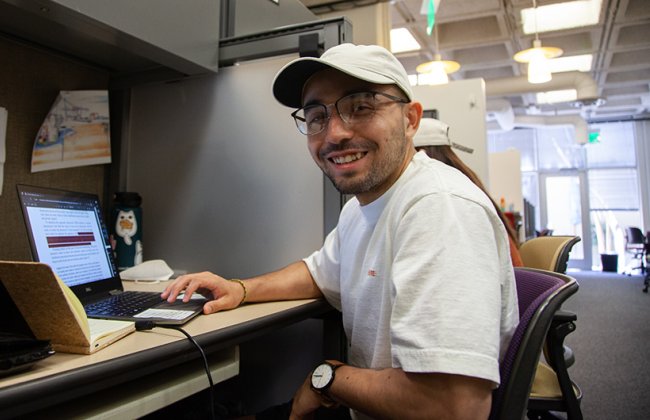
Get to know your fellow students
The communication doctorate program enrolls students from diverse backgrounds, nationalities and educational experiences. Connect with fellow students by viewing their profiles and get to know USC Annenberg through their eyes.
Communication (PhD) faculty

PhD in Communication
Doctor of philosophy in school of communication.
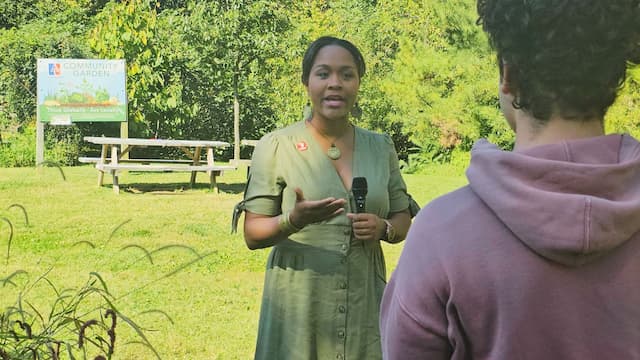
- Request Info
Explore More
(202) 885-2040
McKinley Building, Room 111 on a map
Back to top
At the Intersection of Media, Technology, and Democracy
The AU School of Communication's Doctor of Philosophy in Communication allows you to research at the intersection of media, technology, and democracy. We study how media and technology interact with democratic culture and politics. Communication creates culture; communication is a vector of power; communication is central to democratic action. Our normative orientation toward a healthier democratic process is a theme consistent with the core public service mission of American University. Internet governance, podcasts as news sources, disinformation on Twitter, digital surveillance, facial recognition and power, racism on social media, and state social-media propaganda are all topics of recent dissertations.
Our focus is at the cutting edge of the field of communication studies today, and our students routinely present at our leading conferences. Our approach is also interdisciplinary, and we benefit from the diverse intellectual resources across American University, such as those showcased at the Internet Governance Lab , the AU Game Center , the Center for Media & Social Impact , the Center for Latino and Latin American Studies , and the Institute on Disability and Public Policy (IDPP) . We also tap into our relationships with NGOs, media companies, foundations, and government institutions throughout the Washington metro area.
In our doctoral program, you'll produce scholarship, using both quantitative and qualitative approaches, that has real-world connection and impact . Your work will position you well to pick from career options that range from the professoriate to public policy research to media production to government.
This is a three-year PhD, and from the moment you arrive, you will be working in a highly-structured program toward your dissertation research, building your networks, and developing publishable projects. You will join us in using knowledge to address our most pressing political and social challenge s . We welcome your application to become a part of the next generation of communication scholars, professors, leaders, and practitioners.
Demonstrate Your Commitment and Interest
Applicants for the Communication (PhD) degree program must hold an accredited bachelor's degree and a master's degree in communication, or a related field, with a cumulative GPA of 3.30 or higher, unless the applicant demonstrates comparable experience. The degree does not have to be in the field of communication or be research-based, as many of our PhD students have master's degrees in film or journalism.
Applicants must submit a statement of purpose that outlines the intended research area, what research methods and theories the applicant will use, and which faculty members the applicant hopes to work with.
The candidate must also submit either a master's thesis or another example of substantial research. The GRE is optional. Students should submit their official GRE scores to CEEB code 5007 if desired.
The School of Communication's PhD program operates on a hard deadline. Applications must be received by December 15th. Applications received after the deadline will not be considered.
A complete PhD application consists of the following:
- Statement of purpose
- University transcripts from all universities attended (transcripts from outside of the U.S. must be evaluated by a NACES approevd organization)
- Two letters of recommendation
- GRE scores (optional)
- Master's thesis (or another example of substantial research)
- Proof of English proficiency (100 on the TOEFL, 7.0 on the IELTS, 120 on Duolingo, or a bachelor or master's degree from a university in an English speaking country)
The admissions committee may ask applicants to interview with the program director and affiliated faculty. Interviews are conducted either on campus or virtually.
Financing Your Education
Each year, we welcome several doctoral students with full tuition remission as well as a graduate assistantship . We may also offer admission to top candidates without merit funding. If funding becomes available, students admitted without funding may be eligible to receive a merit package from the school.
The PhD in Communication is 54 credit hours. To estimate the cost of tuition , please see the current cost per credit hour for graduate students.
Students whose funding package includes a graduate assistantship will work as research or teaching assistants for 20 hours per week during the fall and spring semesters.
The School of Communication offers graduate students both merit-based and need-based financial aid . Merit awards, named scholarships, and fellowships are administered by the SOC Graduate Admissions Office, while need-based awards are administered by the American University Office of Financial Aid . Several prestigious graduate fellowships are also available for students in the Political Communication program. Additional financial support is available for veterans .
Each year, we welcome several doctoral students with full tuition remission as well as a graduate assistantship. We may also offer admission to top candidates without merit funding. If funding becomes available, students admitted without funding may be eligible to receive a merit package from the school.
All merit awards are based on your academic merit and professional experience , specifically your undergraduate grades and leadership activities as well as career-related accomplishments. Merit awards are valid for one year-they vary in amount, are typically divided evenly between the fall and spring semesters, and are not typically renewable.
Some merit awards come in the form of graduate assistantships , which consist of graduate tuition remission, a stipend, or both. Tuition remission will vary in the number of credits offered. If you are offered a stipend, you must employed as a graduate assistant for a School of Communication faculty member for 10 hours per week.
Graduate Fellowships for Political Communication
The School of Communication offers prestigious merit-based fellowships in partnership with leading Washington, DC-based media organizations. These fellowships provide varying amounts of tuition remission and stipend and allow you to pursue professional projects with some of the finest media organizations while completing your graduate program. Separate applications are required .
Research fellowships at academic centers within the School of Communication and throughout the university may also be available.
Unless indicated, students may not accept both a graduate assistantship and a graduate fellowship.
Advanced Study at Your Convenience
The School of Communication makes continuing on for your advanced degree a simple, straightforward process. You may apply for admission to our combined bachelor of arts/master of arts program during the second semester of your junior year (after completing 75 credits, but before you have completed 90 credits). Students in any undergraduate major at AU are eligible for consideration. An undergraduate degree in communication is not required.
You may apply for combined degrees in Political Communication, Strategic Communication, Film and Video, Journalism and Public Affairs, Game Design, or International Media.
More information about admissions requirements can be found here.
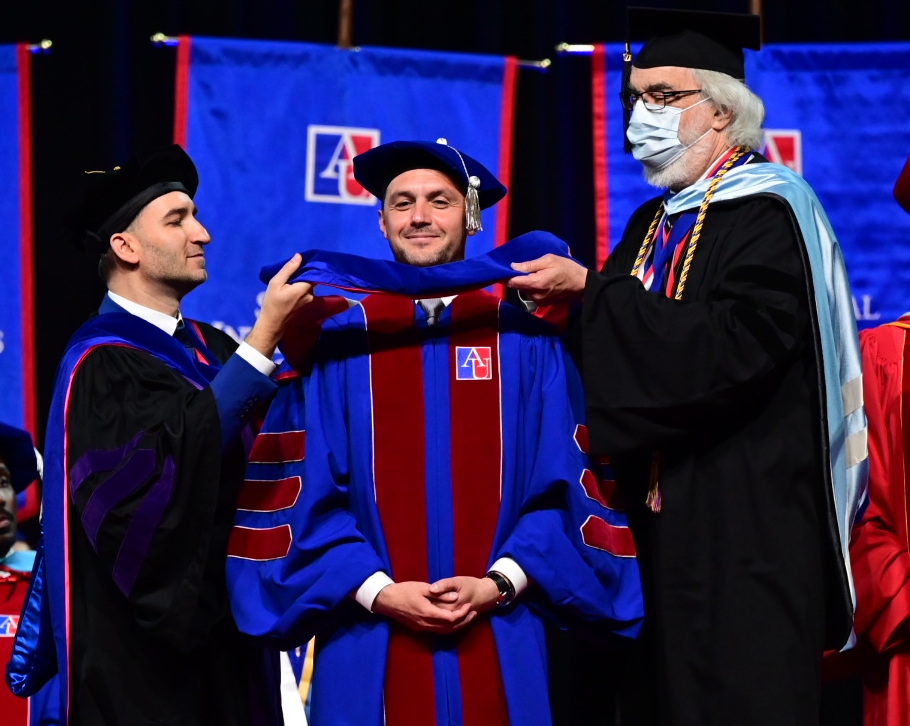
Meet Our Students
Our students produce scholarship, using both quantitative and qualitative approaches, that has real-world connection and impact.

Democracy is a Laughing Matter
In the Top 5 percent of Best Ranked Programs in Communication and Media Studies
According to College Factual

Course Progression
Complete your degree in three years.
In contrast to the traditional 9-month-per-year schedule, your annual course of study takes place over 11 months, including faculty supervision and mentoring via formal course work, organized research group meetings, and online collaboration. The accelerated structure of your program allows you to complete your degree in three years.
You'll take six required courses, three each in the fall and spring semester. Depending on your past master's coursework and professional experience, you may be able to petition for credit for methods and/or statistics course work, substituting an advanced methods course or other elective. The required teaching seminar prepares you to work as a teaching assistant in an undergraduate course during your second year of coursework. Students who have prior college teaching experience or who have already taken a similar teaching seminar as part of their master's program can place out of this course, substituting an additional elective. In the summer immediately following your first year, you'll enroll in one course for credit and participate in research group meetings.
COMM-704: Media, Technology & Democracy (3) This is a foundation overview course focused on scholarship and analysis concerning the intersections of media, technology, and democracy. It also introduces other core courses and study concentrations for advanced study in these topics.
COMM-750: Advanced Media Theory (3) This course examines a range of theories for explaining the complex interrelationships among media, technology, human behavior, social interaction, and democratic processes. It provides an in-depth comparative analysis of theoretical approaches from a variety of academic fields including mass communication, cultural studies, film criticism, and digital media.
COMM-751: Advanced Media Research Methods (3) This course covers major social scientific, historical, ethnographic, qualitative, and critical approaches to media research, including discussions of epistemology, conceptualization, measurement, and ethics.
COMM-754: Media, Law & Policy (3) This course equips students with a strong grounding in U.S laws, policies, and regulatory infrastructure. It analyzes how public debates and political struggles over policy issues have shaped the culture, structure, and operations of contemporary U.S. media industries and institutions.
COMM-711: Teaching Seminar (3) This course provides students with career preparation knowledge, including understanding the culture and history of higher education, teaching skills, and career skills including submission to journals, book proposals, finding appropriate job opportunities, writing cover letters and doing job interviews. Some individual coaching is also involved.
NOTE: This course begins the Friday BEFORE school starts in spring semester, with attendance at an all-day event, the Ann Ferren Conference. This affects your travel schedule over winter holidays!
Approved graduate statistics or research methods course (3) (by preference) OR
Elective selected in consultation with faculty mentor (3)
Note: Students will work with their faculty mentor, who must have an appropriate terminal degree, to select two electives for the first fall semester.
COMM-755: Research Design in Communication (3). This course strengthens student skills in defining an answerable research questions and finding appropriate methodologies.
In the fall, you'll take two electives and a course to prepare you for the comprehensive examinations. By the end of your fall semester, you'll be expected to have gained approval and to have finalized the four faculty members of your doctoral committee, with at least one member being from outside of the School of Communication. At the beginning of your spring semester, you'll begin your qualifying exams. This process takes approximately one month from the assignment of questions to a successful written and oral defense. You will also take a seminar to guide you in developing your dissertation proposal. By the end of the spring semester or beginning of the summer, students are expected to have successfully defended their dissertation proposals and to spend the summer focused on dissertation research.
COMM-860 Seminar in Doctoral Teaching and Research (3) Creation of dissertation literature review and preparation for the comprehensive exam. Introduction to teaching philosophies and strategies, preparation for scholarly career in Communication Studies.
Approved elective courses (6)
Approved graduate statistics or research methods course (3)
COMM-861: Advanced Research & Project Development (3) Prepares students for advancing to candidacy by taking the comprehensive exam and preparing a dissertation proposal.
COMM-898: Doctoral Continuing Enrollment (6) May be taken by doctoral students completing coursework, exams or proposals in preparation for advancement to candidacy.
In the fall and spring semesters, you'll register for dissertation research credits. During the fall and spring semesters, you will also probably be applying and interviewing for jobs, drawing upon information from your first-year course, COMM 711 and on your mentors’ advice. By late spring, your dissertation committee expects to have about six weeks to read and respond to a dissertation draft and to read and respond to a revised version.
Frequently Asked Questions
Who should apply to the phd in communication program.
Applicants could be interested in tenure track, faculty positions in academia, or seeking careers at prestigious institutions in government, industry, and/or the nonprofit community.
How can the PhD program help strengthen my pedagogical skills?
In addition to the teaching seminars and teaching assistantships that are part of the regular doctoral curriculum, The Art of Teaching is a one-credit course offered each spring semester for PhD students who want to learn more about educational pedagogy. The course was originally designed by American University's former provost, Milton Greenberg.
Previously known as the Greenberg Seminars for Effective Teaching, this course complements the PhD academic experience, providing hands-on, practical introduction to professional development and classroom techniques. PhD students can participate at any time during their PhD program. There is no tuition fee for the course.
What are areas of faculty expertise?
Our program is focused on impactful research at the intersection of media, technology, and democracy. Our faculty and students study how media messages and communication technologies shape, and are shaped by, social and governmental processes. Specific sites of research range from Internet governance to music and film culture to social and political organizing to journalism to new media and games. We study communication patterns and their meanings across and between societies on a global scale, including, every continent in addition to indigenous and stateless groups. We draw upon cultural production, critical communication, science and technology studies, law and society perspectives, and other theories, and we use both quantitative and qualitative research methods as well as policy analysis.
What kinds of positions do alumni have now?
Our alumni have found full time and tenure-track jobs at universities throughout the U.S. and around the world, as well as prestigious post-doctoral positions and non-profit and government posts.
What kinds of collaborations can I expect with faculty?
You are assigned a mentor when you first arrive, a selection that results from both your stated interests and faculty interest. This assignment can change by request. You can expect to work with your mentor and, potentially, other faculty on research resulting in joint publications and conference presentations. In your second year, you may assist a faculty member with teaching. Several recent alumni have continued to collaborate with SOC faculty and student colleagues after graduation, resulting in dozens of published research articles, book chapters, and policy papers.
What other opportunities do the school and university offer?
The PhD program offers several PhD Symposia throughout the year, offering informal presentations of completed work and work in progress by both students and faculty. The Internet Governance Lab , a joint program in the School of Communication and School of International Service, offers a range of activities throughout the year, putting a spotlight on Internet policy. The Center for Media & Social Impact offers workshops, events, a biannual conference, and research projects for which you can apply as research assistant. The AU Game Center provides a community of scholars and graduate students in numerous programs across the university engaged in the design, production, and study of games, including the cultural and social impact of the medium, with substantial opportunities for collaboration with faculty, staff, and students across multiple related fields and contexts. The Institute for Immersive Designs, Experiences, Applications, and Stories (Institute for IDEAS) offers paid fellowships and research projects for which you can apply as a research assistant, often collaborating with faculty at other institutions. The PhD programs in the School of Communication, School of International Service, and School of Public Affairs jointly host a day-long research conference featuring work in progress by their PhD students, in February. The university-wide Center for Teaching, Research and Learning (CTRL) provides tools and programs throughout the year to help faculty and PhD students with best practices in teaching, and hosts an annual conference on teaching in January. PhD students are welcome, at no cost. CTRL also offers training and access to research tools . Finally, each PhD student receives enough annual funding to attend at least one major scholarly conference or event, anywhere in the world.
What are examples of dissertations students have written?
Our students have explored a wide diversity of interests with rigorous research, including dissertations such as:
- Lucy Odigie, “Digital Margins: Digital Technology Use, Social Change and the Empowering Strategies of Domestic Workers of Color in Brooklyn, NY”
- Isabelle Zaugg, “Ethiopic: Coding for Linguistic Survival in the Face of Digital Extinction”
- Aras Cosuntuncel, “Networking Authoritarian Neoliberalism: Realigned Strategies of Information Control and Resistance in the Case of Turkey” Dorian Davis, “The Twitter Election? New Perspectives on Agenda-Building during the 2016 Campaign”
- Louisa Imperiale, “Democracy for Sale: A Critical Examination of the Political-Media Complex at work in Campaign Finance and Political Broadcast Regulation in U.S. Presidential Elections from 1976 to 2016”
- Fernanda Rosa, “Global Internet Interconnection Infrastructure: Materiality, Concealment and Surveillance in Contemporary Communication”
- Donte Newman, “Straddling the Fence: How White Facebook Users Express Ambivalence to Navigate the Context Collapse”
- Emily O’Connell, “Hybrid Systems and Hybrid Genres: Exploring U.S. Political Podcast Framing Tactics and Effects”
How many applicants are admitted each year?
Five people are selected each year to join the program, and there are usually about 20 people in the program at any one time.
Can I attend part-time?
The program is designed to be full-time.
Can I take courses outside of the School of Communication?
The SOC PhD program was designed as an interdisciplinary program. We encourage students to take full advantage of the wealth of resources and opportunities across the university, including taking courses and finding expertise in other departments, as well as courses at our partner universities around Washington, DC. Dissertation committees are required to include at least one member outside of the school.
Can I complete my PhD program in 3 years?
The program is designed to be completed in three years, and more than half of our PhD students accomplish their goal in doing so.
Still have questions? Send us an email: [email protected]
Please send me information about PhD in Communication
It looks like you already used that name and address to request information for one or more AU graduate program(s).
If you have not previously requested AU graduate program information, create a new request
Ohio State nav bar
Ohio state navigation bar.
- BuckeyeLink
- Search Ohio State
PhD in Communication
In the Ph.D. program in Communication at The Ohio State University, students work closely with world-renowned faculty on current research. In coursework, the emphasis is on understanding the body of knowledge in communication and on learning how to use what is known to generate new knowledge through research. In addition to gaining a solid grounding in the communication literature, through our Ph.D. program students learn the skills necessary to develop solid academic careers through teaching, attending professional conferences and publishing their own research.
We offer funding to all doctoral students admitted to our program.
Doctoral students work closely with distinguished scholars as mentors in developing individualized programs focusing on the topics that intersect the interests of the faculty and the student. Over the course of their program, students are encouraged to co-author papers and journal articles with faculty members.
Through generous travel awards, the School of Communication, as well as the Graduate School at OSU, enable students to participate in national and international communication conferences. At these conferences our students become acquainted with faculty and graduate students from other universities around the world, establishing lasting friendships and professional relationships.
Through the combination of training, mentoring and socialization, our students are among the most sought-after for the top positions in the field.
Most of our Ph.D. students enter academic careers following graduation, although some enter various communication industries and use their research skills in marketing, polling, media or other industries.
For more information, contact the Graduate Program Coordinator by email at [email protected] or call (614) 292-6503.
You can read more about our graduate program requirements and our admissions procedures on the following documents:
Some links on this page are to Adobe .pdf files requiring the use of Adobe Reader. If you need these files in a more accessible format, please contact [email protected] .
Explore your training options in 10 minutes Get Started
- Graduate Stories
- Partner Spotlights
- Bootcamp Prep
- Bootcamp Admissions
- University Bootcamps
- Coding Tools
- Software Engineering
- Web Development
- Data Science
- Tech Guides
- Tech Resources
- Career Advice
- Online Learning
- Internships
- Apprenticeships
- Tech Salaries
- Associate Degree
- Bachelor's Degree
- Master's Degree
- University Admissions
- Best Schools
- Certifications
- Bootcamp Financing
- Higher Ed Financing
- Scholarships
- Financial Aid
- Best Coding Bootcamps
- Best Online Bootcamps
- Best Web Design Bootcamps
- Best Data Science Bootcamps
- Best Technology Sales Bootcamps
- Best Data Analytics Bootcamps
- Best Cybersecurity Bootcamps
- Best Digital Marketing Bootcamps
- Los Angeles
- San Francisco
- Browse All Locations
- Digital Marketing
- Machine Learning
- See All Subjects
- Bootcamps 101
- Full-Stack Development
- Career Changes
- View all Career Discussions
- Mobile App Development
- Cybersecurity
- Product Management
- UX/UI Design
- What is a Coding Bootcamp?
- Are Coding Bootcamps Worth It?
- How to Choose a Coding Bootcamp
- Best Online Coding Bootcamps and Courses
- Best Free Bootcamps and Coding Training
- Coding Bootcamp vs. Community College
- Coding Bootcamp vs. Self-Learning
- Bootcamps vs. Certifications: Compared
- What Is a Coding Bootcamp Job Guarantee?
- How to Pay for Coding Bootcamp
- Ultimate Guide to Coding Bootcamp Loans
- Best Coding Bootcamp Scholarships and Grants
- Education Stipends for Coding Bootcamps
- Get Your Coding Bootcamp Sponsored by Your Employer
- GI Bill and Coding Bootcamps
- Tech Intevriews
- Our Enterprise Solution
- Connect With Us
- Publication
- Reskill America
- Partner With Us
- Resource Center
- Bachelor’s Degree
- Master’s Degree
Best Online Doctorates in Communication: Top PhD Programs, Career Paths, and Salary
The best online PhD in Communication offers you a flexible higher education path that will allow you to increase your earning potential and employability without having to step foot on campus. If getting your communication PhD online sounds appealing to you, read on to find out more about the top PhD programs in the country as well as the best communication jobs you can get after earning yours.
In this guide, you’ll get an in-depth look at how you can earn your doctorate without having to put the rest of your life on hold and a breakdown of the cost, admission requirements, and other details about each program. This article will help you with your school search by giving you a detailed look at the best online PhDs in Communication in the country.
Find your bootcamp match
Can you get a phd in communication online.
Yes, you can get a PhD in Communication online. There are several institutions that offer either fully online or hybrid PhD programs for students looking for a more flexible learning format. While there are some key differences between online and on-campus programs, both of these research-based degrees typically require the completion of the same number of credit hours.
Is an Online PhD Respected?
Yes, an online PhD is respected. Any PhD earned from an accredited institution is respected and holds the same weight no matter the learning format. Online classes are of the same quality as in-person classes and are optimized for distance learning. While on-campus students may have access to more physical resources, online programs take this limitation into consideration and compensate for it. Hence, online degrees are respected by many employers today.
What Is the Best Online PhD Program in Communication?
The best online PhD program in communication is the PhD in Media and Communication offered by Indiana State University, which provides a flexible learning method. Designed for part-time and full-time students, this program only takes three years to complete at most and offers its students plenty of hands-on experience through its online courses.
Why Indiana State University Has the Best Online PhD Program in Communication
Indiana State University has the best online communication PhD program because not only is it one of the most affordable doctoral programs on our list, but it’s also one of the most flexible, allowing students to adjust their course load to best accommodate their schedules. It is also the shortest of all doctoral programs on our list, even when taken part time.
Best Online Master’s Degrees
[query_class_embed] online-*subject-masters-degrees
Online PhD in Communication Admission Requirements
The admission requirements for an online PhD in Communication are different from one school to another. That being said, you’ll typically need to submit an online application form and provide your official transcripts from any institute you’ve previously attended, a scholarly writing sample, your resume, a list of references, your GRE test scores , and a personal statement.
- An online application form
- All of your postsecondary transcripts
- A writing sample
- Your current resume
- A list of references or reference letters
- A personal statement
- Your GRE scores
Best Online PhDs in Communication: Top Degree Program Details
| School | Program | Estimated Length |
|---|---|---|
| American University | PhD in Communication | 3 years |
| Indiana University of Pennsylvania | PhD in Media and Communication | 2-3 years |
| Liberty University | PhD in Communication | 3 years |
| Michigan State University | PhD in Communication | 4 years |
| Regent University | PhD in Communication | 2-3 years |
| Robert Morris University | PhD in Information Systems and Communication | 3 years |
| Texas Tech University | Doctor of Philosophy in Technical Communication & Rhetoric | 4 years |
| The University of Alabama | Doctorate in Communication and Information Sciences | 3-4 years |
| University of Colorado Boulder | PhD in Strategic Communication | 5 years |
| University of North Dakota | PhD in Communication | 3-5 years |
Best Online PhDs in Communication: Top University Programs to Get a PhD in Communication Online
The top university programs to get a PhD in Communication online are all terminal degrees, meaning that they are the highest level of education you can get in the field. These programs are designed to provide students with the skills and knowledge they need to achieve their career goals and earn a high annual wage after graduating. Here’s our list of the best online PhDs in Communication.
Boasting internationally-renowned faculty and being highly ranked among all schools and colleges across the country, American University is a research university that was established in 1893. Headquartered in Washington DC, The university offers flexible learning options across its various online programs specializing in numerous disciplines.
PhD in Communication
American University uses an interdisciplinary program to approach its coursework and offers its PhD students a highly-structured program that addresses political and social challenges. This three-year program teaches its students about the relationship between media, technology, and politics and how to analyze it critically.
PhD in Communication Overview
- Accreditation: Accreditation Service for International Schools, Colleges, and Universities
- Program Length: 3 years
- Acceptance Rate: Not specified, but only 5 applicants are admitted each year
- Tuition: $1,866/credit
PhD in Communication Admission Requirements
- Submit a completed online application form.
- Submit an admissions essay, two letters of recommendation, and your master’s thesis.
- Submit your GRE scores.
- Provide an updated resume.
- Provide your transcripts from all previous universities and colleges attended.
- Complete an interview if requested by the program director.
Indiana University of Pennsylvania (IUP) is a research institute that was established in 1875. The university offers over 140 undergraduate programs of study, 56 master's degree programs, and 14 doctoral degree programs. Prospective students at this accredited school can choose between an in-person program, an online program, and a hybrid program in most fields of study.
PhD in Media and Communication
The media and communication studies online program at IUP is flexible, teaching students the skills they need to be able to work in communication and training for the corporate space, health and political communication, media and management, and more. Prospective students wanting to enroll in this program can adjust their course load to fit their needs.
PhD in Media and Communication Overview
- Accreditation: Middle States Commission on Higher Education
- Program Length: Two to three years
- Acceptance Rate: 72%
- Tuition and Fees: $516/credit (in state); $593/credit (out of state)
PhD in Media and Communication Admission Requirements
- Create your admissions profile.
- Provide your official transcripts from all attended colleges and universities.
- Complete the online application.
- Upload your goal statement, two letters of recommendation, and a writing sample.
- Attend an interview if requested by the admissions faculty.
Established in 1972, Liberty University is a Christian, private, non-profit institution headquartered in Lynchburg, Virginia. Liberty University prides itself in providing a high-quality education at an affordable cost. One of the largest private universities in the country, Liberty University is currently home to almost 94,000 students.
The PhD in Communication degree program at Liberty University is delivered fully online. This 60-credit doctoral program in the study of communications focuses on qualitative research methods and theory, equipping you with the skills needed to become a leader in a variety of areas of business or become a researcher or a college professor.
- Accreditation: Southern Association of Colleges and Schools Commission on Colleges
- Acceptance Rate: N/A
- Tuition and Fees: $595/credit
- Fill out and submit your online application.
- Have a minimum college GPA of 3.0.
- Pay the $50 application fee.
- Submit your official transcripts of all previously attended postsecondary institutions.
Michigan State University (MSU) was founded in 1855 and is among the top research universities in the country. With over 200 academic programs offered at its East Lansing, Michigan campus, students can choose from a wide variety of specialties among its comprehensive doctorate programs. The communication programs offered at the institute are all highly ranked.
As early as 1961, the PhD in Communication at MSU has been recognized as being one of the most prestigious in the world. The structure of this graduate degree program focuses on communication theory, quantitative methods, and teamwork, allowing students to work in behavioral research, teaching, and communication consultancy or even specialize in hospitality research.
- Accreditation: Higher Learning Commission
- Program Length: 4 years
- Tuition and Fees: 817.25/credit (in state); 1,605.75/credit (out of state)
- Complete the online MSU Graduate School Application and pay the application fee.
- Provide a list of three referees and their email addresses.
- Submit an academic statement and a personal statement.
- Provide a copy of your resume.
- Submit a copy of your official transcripts to the Department of Communication PhD Program.
- Submit your GRE scores (optional).
Regent University was founded in 1978 and offers 60 programs for its online school graduate students to choose from. The institute has consistently ranked among the top national universities by US News & World Report. Prospective students can choose from a wide range of programs spanning many different fields of study at Regent University.
Regent University’s PhD in Communication is offered online alongside a one-week summer residency in Virginia Beach. This graduate degree takes an interdisciplinary approach to training, scholarly writing, and research and allows students to improve their communication and research skills . Common careers for graduates of this program include working as a writer, teacher, speaker, or thought leader.
- Program Length: 2-3 years
- Tuition and Fees: $950/credit
- Submit your application using the Regent University online application portal.
- Submit a minimum five-page scholarly or published writing sample that demonstrates your research, writing, analytical and problem-solving skills.
- Submit your unofficial college transcripts.
- Complete Regent University’s Academic Background Questionnaire.
- Provide a scanned copy of a government-issued ID.
Established in 1921, Robert Morris University (RMU) is a private institution that offers 60 bachelor's degree programs and 35 master's and doctoral programs. Home to approximately 4,100 students, most of which are undergraduate students, Robert Morris University’s doctoral degree in communication is one of the few PhD programs the school offers.
PhD in Information Systems and Communication
The PhD in Media and Communication at RMU is an executive-style doctor of philosophy program structured to give students the tools they need to become scholarly researchers and leaders. Through a blended learning format, the school uses an interdisciplinary approach to help students analyze the connections between technology and human communication.
PhD in Information Systems and Communication Overview
- Tuition and Fees: $1,207/credit
PhD in Information Systems and Communication Admission Requirements
- Have a master’s degree from an accredited institution with a minimum 3.0 GPA.
- Submit an online application.
- Submit your official transcripts of all undergraduate and graduate coursework.
- Provide three letters of reference and a current resume.
- Provide an academic writing sample.
- Complete an interview with the Doctoral Program Director and Doctoral Admissions Committee.
Founded in Lubbock, Texas, in 1923, Texas Tech University is a public research institution offering degree programs at the bachelor’s, master’s, and doctoral-level. Home to over 40,000 students, Texas Tech has produced a large number of notable alumni across a wide variety of fields of study.
Doctor of Philosophy in Technical Communication & Rhetoric
The PhD in Technical Communication & Rhetoric at Texas Tech allows students to develop their knowledge of rhetoric, writing, technical communication, and composition. Students can specialize in technical communication and user-centered design, rhetorical theory and practice, composition, writing, and literacy studies.
Doctor of Philosophy in Technical Communication & Rhetoric Overview
- Tuition and Fees: $8,653/year (in state); $16,180/year (out-of-state)
Doctor of Philosophy in Technical Communication & Rhetoric Admission Requirements
- Submit a graduate course paper or the equivalent that demonstrates your ability to develop a thesis using research and analysis.
- Submit a statement of purpose.
- Submit a copy of your resume, three letters of reference, and a signed copy of the Distance Learning Agreement.
Established in 1820, The University of Alabama has consistently produced award-winning graduates. These include sixty Goldwater Scholars, 16 Rhodes Scholars, 16 Truman Scholars, 37 Hollings Scholars, and 16 Boren Scholars. The school is well known for its programs in social sciences and business.
Doctorate in Communication and Information Sciences
The PhD in Communication & Information Sciences at The University of Alabama prepares students to work as library professionals and leaders in information environments. This online program has a curriculum that blends scholarly research and synchronous online courses to develop well-rounded graduates.
Doctorate in Communication and Information Sciences Overview
- Program Length: 2-4 years
- Tuition and Fees: $440/credit
Doctorate in Communication and Information Sciences Admission Requirements
- Have a Master’s Degree in Communications or in a related field with a minimum cumulative GPA of 3.0.
- Complete a graduate school application form and pay the application fee.
- Provide a statement of purpose and a copy of your resume.
- Provide the names and contact information for three academic references.
- Provide your unofficial college transcripts.
The University of Colorado Boulder was founded in 1876 and offers 124 master's, doctoral and professional degree programs. The institute is one of the country’s top-ranked Tier 1 research institutions and is one of only 35 public research institutions in the Association of American Universities (AAU).

"Career Karma entered my life when I needed it most and quickly helped me match with a bootcamp. Two months after graduating, I found my dream job that aligned with my values and goals in life!"
Venus, Software Engineer at Rockbot
PhD in Strategic Communication
This program’s coursework trains students in communication theory and research, as well as strategic communication research methods. The curriculum focuses on mass communication and public communication studies, literature and academic journals, social media trends , political communication, media organizations, and video games.
PhD in Strategic Communication Overview
- Program Length: 5 years
- Tuition and Fees: $866.29/credit
PhD in Strategic Communication Admission Requirements
- Have a master’s degree with a minimum graduate GPA of 3.5.
- Submit a personal statement, three letters of reference, and a scholarly writing sample.
- Submit an academic and professional resume.
- Provide the unofficial transcripts of all undergraduate and graduate courses you’ve taken.
Established in 1883, the University of North Dakota (UND) is a public research university recognized for leading research in engineering, medicine, aviation, space, and unmanned aircraft systems. The university also has the largest number of fully-online students among all universities in its region.
The PhD in Communication degree program at UND teaches students about the role of communication within the global community, as well as the international and intercultural contexts surrounding it. The curriculum focuses on critical thinking and the diverse nature of human communication across various cultures and systems.
- Program Length: 3-5 years
- Tuition and Fees: $660.08/credit
- Create an admissions account on the school portal.
- Submit an online application and pay the application fee.
- Submit your official transcripts and GRE scores.
- Submit a statement of interest detailing your personal goals and the relevance of the Doctor of Philosophy in Communication to those goals.
- Submit an original academic paper that shows your ability to articulate and synthesize ideas.
- Provide three letters of recommendation from sources familiar with your potential as a doctoral student in communication.
Online Communication PhD Graduation Rates: How Hard Is It to Complete an Online PhD Program in Communication?
It is somewhat hard to complete an online PhD program in communication. While the curricular content can be quite complex, most online programs are structured to be flexible, meaning that students can more easily take the time they need to learn what they’re being taught. Online PhDs require hard work, dedication, and motivation to complete even more than on-campus programs.
How Long Does It Take to Get a PhD in Communication Online?
It takes about two to five years to get a PhD in Communication online. The amount of time it takes you to complete your program depends heavily on whether you study part time or full time, if you have any transfer credits from other institutions, and the structure and curriculum of your chosen program. Most universities have a seven-year cap on their PhD programs.
How Hard Is an Online Doctorate in Communication?
An online doctorate in communication is not very hard to get if you are able to dedicate the time and effort required. A doctorate is the highest level of formal education that is available, meaning that it will be challenging, and while an online PhD may offer more flexibility, it doesn’t make the learning aspect of it any easier. Online programs only make it easier to fit other commitments into your life while pursuing your degree.
Best PhD Programs
[query_class_embed] phd-in-*subject
What Courses Are in an Online Communication PhD Program?
The courses in an online communication PhD program include Organizational Communication, Communication and Technology, Interpersonal Communication, and Health Communication, to name a few. Each program offers a different variety of introductory courses, advanced core courses, and elective courses.
Main Areas of Study in a Communication PhD Program
- Organizational communication
- Communication and technology
- Interpersonal communication
- Health communication
How Much Does Getting an Online Communication PhD Cost?
It costs $19,314 per year to get a PhD in Communication, on average, according to the National Center for Education Statistics. The actual cost of your degree is dependent on the institution you attend and whether it is private, public, or non-profit. Public universities typically cost the least to attend, and private and for-profit institutions will cost more.
How to Pay for an Online PhD Program in Communication
You can pay for an online PhD program in communication by either choosing from a selection of fully-funded doctoral programs, qualifying for a scholarship, applying for financial aid , or making an arrangement for a long-term pay-off plan. Many scholarships are offered through the research departments of some schools. Make sure to research what opportunities the school you’re interested in provides.
How to Get an Online PhD for Free
You cannot get an online PhDs for free. Online PhDs all require some form of payment. The only exception is those that offer full funding. Even then, this is done through an application and selection process, and not everyone qualifies for it. If you require financial aid, your best bet is to choose one of the aforementioned methods to reduce your financial burden.
What Is the Most Affordable Online PhD in Communication Degree Program?
The most affordable online PhD in Communication degree program is the PhD in Media and Communication offered by the Indiana University of Pennsylvania. This program will only cost you $319 per credit, making it much less expensive than the other programs on our list, which can cost up to $1,866 per credit.
Most Affordable Online PhD Programs in Communication: In Brief
| School | Program | Tuition |
|---|---|---|
| Indiana University of Pennsylvania | PhD in Media and communication | $319 per credit |
| University of Alabama | Doctorate in communication and Information Sciences | $440 per credit |
| Liberty University | PhD in Communication | $595 per credit |
| University of North Dakota | PhD in Communication | $660.08 per credit |
| Michigan State University | PhD in Communication | $817.25 per credit |
Why You Should Get an Online PhD in Communication
You should get an online PhD in Communication because of the flexible and more convenient learning format it offers. Online programs give you the option to work or have time for other commitments such as your family. Online degree programs also tend to be less expensive than in-person degree programs.
Additionally, as previously mentioned, an online degree from an accredited institution is as valid as an in-person degree program. Having a PhD will increase your earning potential, allow you to work in a wider range of areas, and allow you to climb the corporate or institutional ladder more easily.
Top Reasons for Getting a PhD in Communication
- Career options. Because the knowledge and skills you’ve gained during your communication degree are useful and applicable in many industries, you’ll have a wider variety of options for career paths that you can pursue.
- Career outlook. The projected job growth for the common careers available to communication PhD grads indicates that, over the next decade, there is a good chance of finding employment upon completing your doctoral degree program.
- Higher-paying jobs . Since a PhD is the highest form of formal education you can get, that gives you a leg up when searching for employment opportunities. Employers generally seek out the most qualified candidates for the jobs they are offering. With a PhD, you will be among the most qualified and will be able to negotiate for a higher salary.
- Interest in expanding knowledge. Arguably, the best reason to get a PhD is the desire to learn more about an area you have a keen interest in. If you have the privilege of pursuing a degree in a topic you are passionate about, that in itself is reason enough to do it.
Best Master’s Degree Programs
[query_class_embed] *subject-masters-degrees
What Is the Difference Between an On-Campus Communication PhD and an Online PhD in Communication?
The difference between an on-campus communication PhD and an online PhD in Communication is the learning format and flexibility that an online degree program offers to its students and isn’t available to on-campus students. Whether you choose to get your PhD in Communication online or in person, the quality of the education you are receiving won’t change.
Online PhD vs On-Campus PhD: Key Differences
- Flexibility. The flexibility offered by online learning is perhaps the most notable difference between an online PhD and an on-campus PhD. Online programs are specifically designed for busy professionals and generally are more conducive to part-time enrollment.
- Cost. Typically, it costs less to enroll in an online degree program than it does to attend on-campus classes because distance learning students use fewer of the university’s resources. Additionally, when you factor in costs related to travel and supplies, the total expense of studying online tends to be significantly lower.
- College options. Another aspect of not having to travel to campus is that it opens up many more options when it comes to where you can choose to study. Not being limited by distance allows you to consider schools that you might have otherwise not been able to attend.
- Study locations. Whether you choose to study from home, in a library, or any other location, your learning environment is up to you. That being said, the benefit of studying on campus is that the formal environment often makes it easier to stay focused during your communication studies.
How to Get a PhD in Communication Online: A Step-by-Step Guide

To get a PhD in Communication online, you need to submit an application on the school website or portal, complete all of the required coursework set by the program, get your dissertation topic approved by the program’s faculty, pass all qualifying and comprehensive exams, and finally defend and submit your dissertation.
The first step to getting your communication PhD is applying. In most cases, you’ll need to fill out an application form with your personal details and the details of the degree you want to pursue and submit any additional materials to support your application. These usually include transcripts, a resume, and letters of recommendation, among others.
All doctoral students must complete a certain number of required courses throughout their PhD studies. The total number of courses you need to complete will differ from one institution to the next, but your academic advisor will be able to help you plan out your schedule in accordance with whether you are attending a program part time or full time.
At the same time as you work through your required courses, you will also need to present a dissertation topic that will be the focus of your PhD research. After its approval by your supervisor and the program director, you’ll be able to start your research. At multiple points during your research, you’ll need to demonstrate your progress to your supervisor.
To earn your doctoral degree in communication, you’ll need to pass qualifying and comprehensive exams. PhD faculty use these exams to ensure that their students are able to retain and use the knowledge they are gathering during their courses. Keep in mind that simply passing may not be enough. Most programs require that students maintain a minimum GPA throughout their studies.
The last thing you need to do to earn your PhD is to defend your dissertation in front of the program committee and director. If you succeed and have completed all of your coursework and maintained an acceptable GPA throughout your studies while staying in good academic standing, you will be able to apply for graduation.
Online PhD in Communication Salary and Job Outlook
The job outlook for online PhD in Communication holders from 2020 to 2030 looks promising. According to the US Bureau of Labor Statistics, media and communication occupations have a projected 14 percent growth . This is faster than the average projection for all occupations, which indicates that communication PhD graduates should not face many challenges in their job search.
What Can You Do With an Online Doctorate in Communication?
With an online doctorate in communication, you can explore various career paths, including sales management, technical writing, human resources management, and marketing management. In addition, you can also become a professor .
Best Jobs with a PhD in Communication
- Sales Manager
- Technical Writer
- Human Resources Manager
- Marketing Manager
- Postsecondary Teacher
Potential Careers With a Communication Degree
[query_class_embed] how-to-become-a-*profession
What Is the Average Salary for an Online PhD Holder in Communication?
The average salary for an online PhD holder in communication is $74,000 per year , according to PayScale. That means that you have the potential to earn a slightly higher salary than the average American employee’s salary . The actual amount you earn will depend heavily on your location, employer, job title, and experience.
Highest-Paying Communication Jobs for PhD Grads
| Online Communication PhD Jobs | Average Salary |
|---|---|
| Marketing Manager | |
| Human Resources Manager | |
| Postsecondary Teacher | |
| Technical Writer | |
| Public Relations Specialist |
Best Communication Jobs for Online PhD Holders
The best communication jobs for online PhD holders are all jobs that heavily utilize your understanding of how humans interact with one another as well as how factors such as technology and media affect this. In the following section, we break down some of the best jobs you can get with a PhD in Communication, including their salary, outlook, and the highest-paying states.
Marketing managers work in industries such as advertising, finance, healthcare, hospitality, education, and retail to execute strategies that raise consumer awareness. These strategies include promotional work that appeals to the consumers and maximizes profits and, ultimately, the company’s success.
- Salary with a Communication PhD: $133,380
- Job Outlook: 10% job growth from 2020 to 2030
- Number of Jobs: 316,800
- Highest-Paying States: New York, New Jersey, California, Delaware, Virginia
Human resources managers play an incredibly vital role in the proper functioning of any business. HR managers are tasked with hiring new employees and serving as the liaison between a company and its employees. HR managers are charged with the important responsibility of finding the best-suited candidates who will help push the company to new highs.
- Salary with a Communication PhD: $126,230
- Job Outlook: 9% job growth from 2020 to 2030
- Number of Jobs: 161,700
- Highest-Paying States: New York, New Jersey, District of Columbia, Massachusetts, Rhode Island
Postsecondary teachers, also called professors, teach students at universities and colleges, conduct research, and publish materials related to their field of study. You can choose to be a professor in any academic subject that is related to your PhD and teach at almost any academic level, depending on your level of experience.
- Salary with a Communication PhD: $79,640
- Job Outlook: 12% job growth from 2020 to 2030
- Number of Jobs: 1,276,900
- Highest-Paying States: California, Alaska, New York, District of Columbia, New Jersey
The job of a technical writer is to write academic journal articles, develop product manuals that teach people how to use products, write website help sections, and write about any other informational content that requires technical knowledge. Strong academic and corporate communication skills are vital for this position.
- Salary with a Communication PhD: $78,060
- Number of Jobs: 52,300
- Highest-Paying States: Delaware, California, Massachusetts, Hawaii, District of Columbia
Public relations specialists work for various types of organizations including schools and professional associations and are tasked with creating media releases, attending meetings and events, delivering speeches, and, generally, creating and maintaining a good public image for those they represent.
- Salary with a Communication PhD: $62,800
- Job Outlook: 11% job growth from 2020 to 2030
- Number of Jobs: 273,300
- Highest-Paying States: District of Columbia, Washington, New York, Virginia, California
Is It Worth It to Do a PhD in Communication Online?
Yes, it is worth it to do a PhD in Communication online if you wish to advance your knowledge and skills and work in the field of communications, retaining a significantly larger amount of flexibility than if you were enrolled in an in-person program. The variety of career options that this degree will offer you when you choose a career path is well worth the hard work.
A PhD in Communication will allow for quicker professional development when compared to the less advanced degree options within the field, allowing you to enter into higher and better-paying positions once you have graduated. With a PhD being a terminal degree in this field, you will have an incredible leg up over other candidates during your job search.
Additional Reading About Communication
[query_class_embed] https://careerkarma.com/blog/everything-about-communications-degree/ https://careerkarma.com/blog/communication-associate-degrees/ https://careerkarma.com/blog/best-online-communication-associate-degrees/
Online PhD in Communication FAQ
The most common specializations with a PhD in Communication include advanced communication theory, feminist studies, global communication, and cultural studies, to name a few. There are many specialization options you can choose from for your online PhD in Communication. In general, communications degrees can prove quite useful in different industries, so it is worth it pursuing a PhD in this field.
The degrees that you can get in communication include an associate degree , a bachelor’s degree, a master’s degree, as well as a PhD in Communication. The kind of degree you should get depends on your career goals.
Yes, there are associations and organizations you can join with careers in communication, such as the International Communication Association (ICA), the Public Relations Society of America (PRSA), and the Global Alliance for Public Relations and Communication Management (GAPRCM). There are several jobs for communication degree holders .
Yes, you can get an online PhD in Communication without a master’s degree. While not as common, you can apply for a PhD in Communication with only a bachelor’s degree at certain institutions. Make sure to check your desired program’s admission requirements to see if it’s a possibility for you and look at interesting communication topics you can research during your PhD.
About us: Career Karma is a platform designed to help job seekers find, research, and connect with job training programs to advance their careers. Learn about the CK publication .
What's Next?
Get matched with top bootcamps
Ask a question to our community, take our careers quiz.
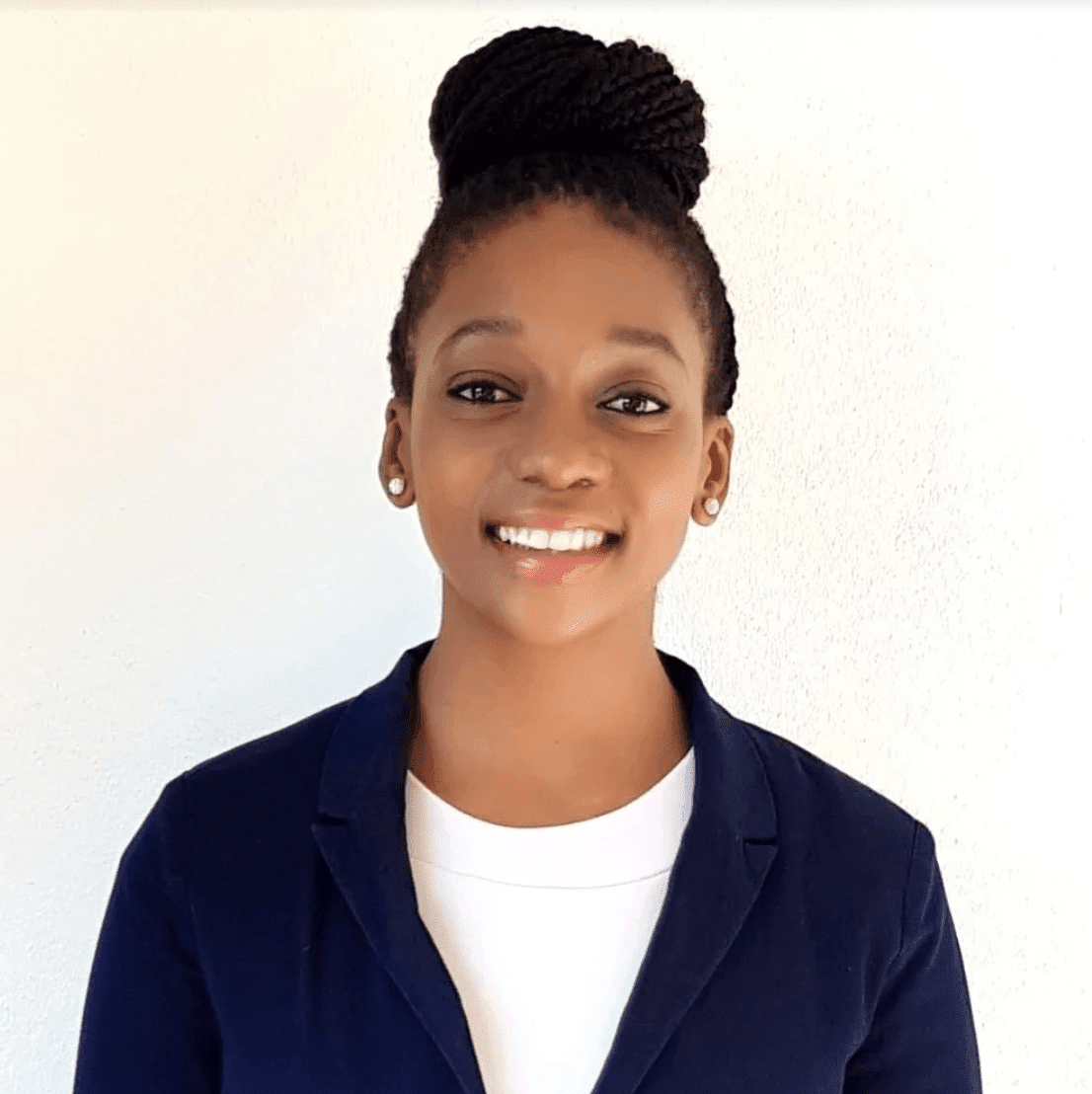
Leave a Reply Cancel reply
Your email address will not be published. Required fields are marked *


Doctorate in Communication
With one of the nation's premier doctoral programs in Communication, the Annenberg School is a tight-knit, supportive community of scholars committed to advancing knowledge of our media environment.
Founded through the generosity and vision of publisher, diplomat, and philanthropist Walter Annenberg, the Annenberg School for Communication is devoted to furthering our understanding of the role of communication in public life through research, education, and service. Our five-year doctoral program has a strong reputation as one of the best in Communication, based on Annenberg’s unparalleled combination of world-class faculty , students , and alumni , as well as access to the larger intellectual and cultural resources of the University of Pennsylvania and Philadelphia .

In an inherently interdisciplinary field, Annenberg researchers are engaged with a spectrum of topics related to health, politics, media systems, networks and digital culture, journalism, race and gender, and more, using both qualitative and quantitative methodologies.
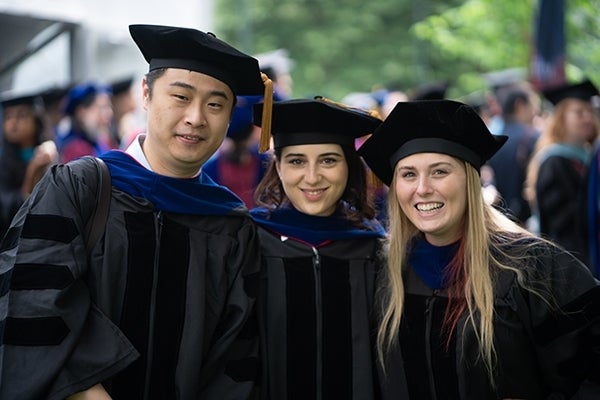
Our Ph.D. program allows students to tailor a curriculum to suit their specific interests, and provides them the financial resources to launch their academic career.
In addition to a full tuition waiver, our students currently receive an annual stipend as well as a budget for research and travel and health insurance for all five years.
Annenberg is the smallest of the 12 schools at Penn, and it functions as close-knit community of scholars whose doors are always open to one another. Our students also appreciate our staff , who routinely go above and beyond to support them.
Please note that we do not have a standalone master’s degree program at this time. All students are admitted directly into the doctoral program.
Request for More Information
The application will open in October.
Our Students By the Numbers
Here are some fast facts about our students and the admissions process . Get to know Annenberg!
Students currently in the program
Different nationalities represented by our students, applicants each year, students accepted each year, average undergraduate gpa of applicants, average toefl of admitted candidates, of students came from a previous graduate degree program, of students worked in a career before joining annenberg, of students came straight to annenberg from an undergraduate degree.
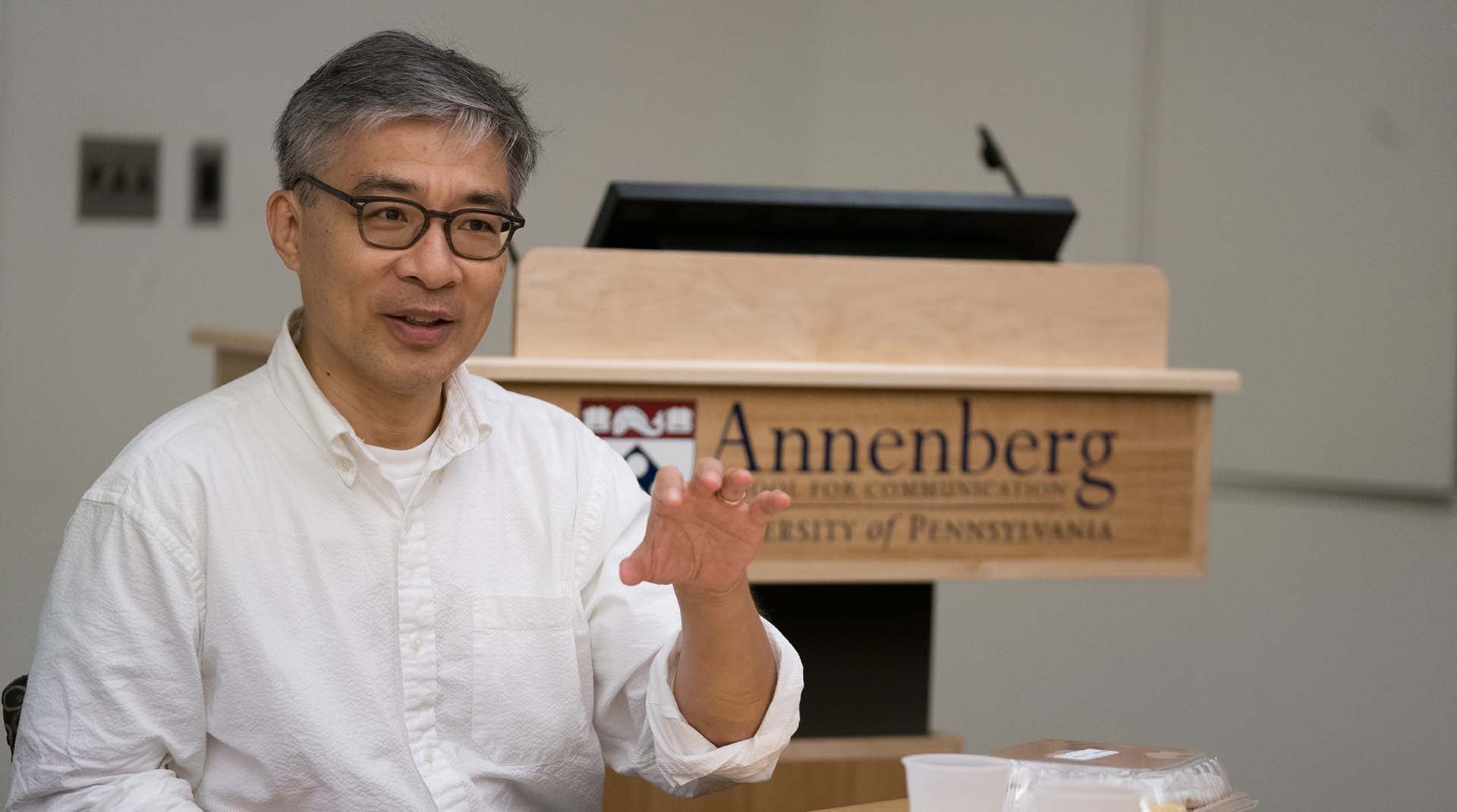
Our Faculty
Our graduate faculty is at the heart of the school. Their innovative work, often in collaboration with students, pushes the field of Communication forward.
Students on Video
Hear from some of the Annenberg School's doctoral students as they talk about their work and what brought them to Annenberg.
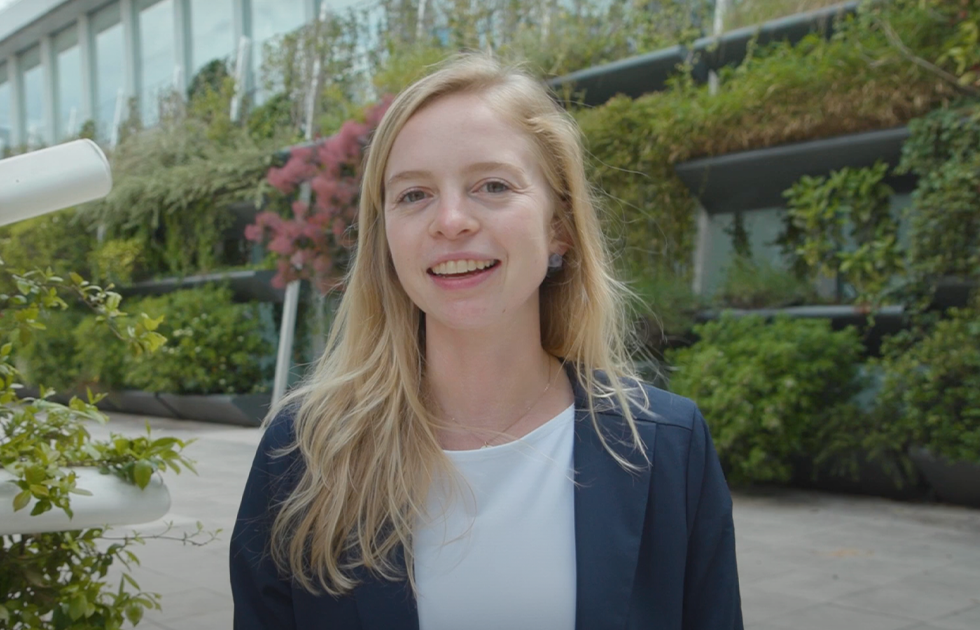
What is it like to be a doctoral student at the International Communication Association annual conference? We followed four students to find out.
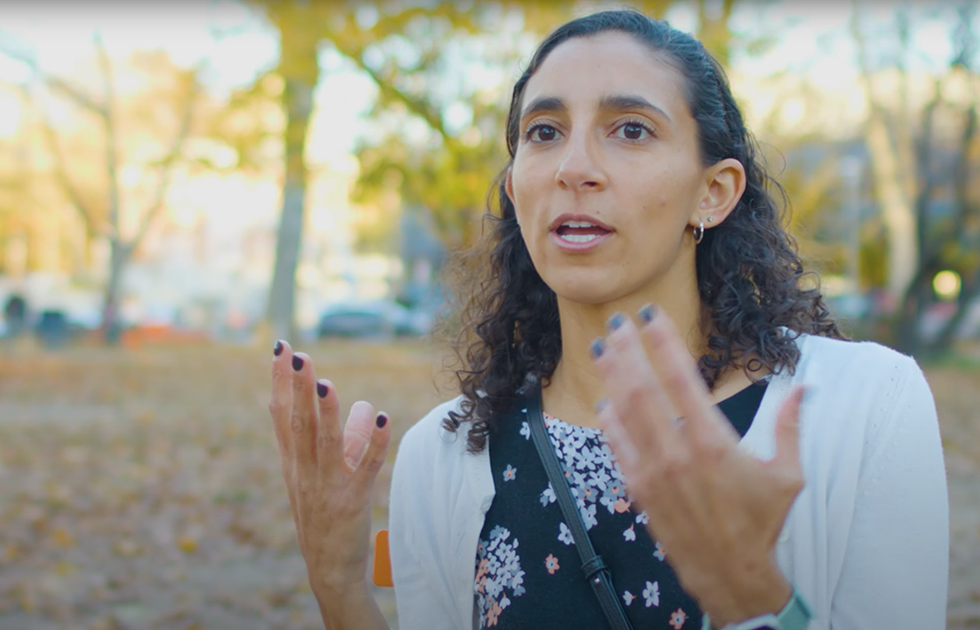
During the early days of the COVID-19 pandemic, doctoral candidate Kelly Diaz used her phone to document the many signs displayed in yards and windows around her West Philadelphia home. She has now collected that body of work into a photo essay .
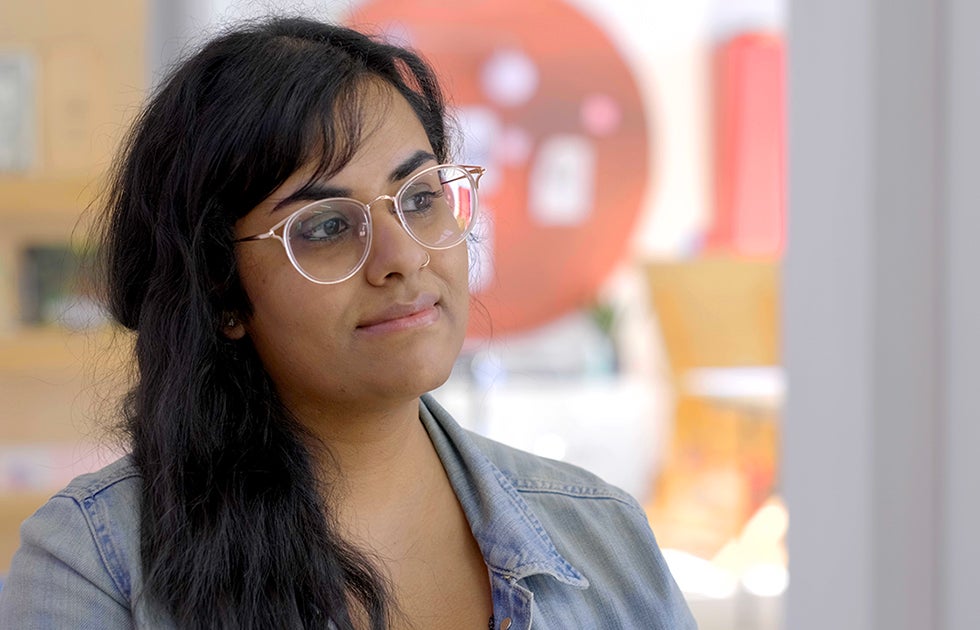
Doctoral Candidate and artist Roopa Vasudevan studies the ways that the everyday technologies shape our daily lives.
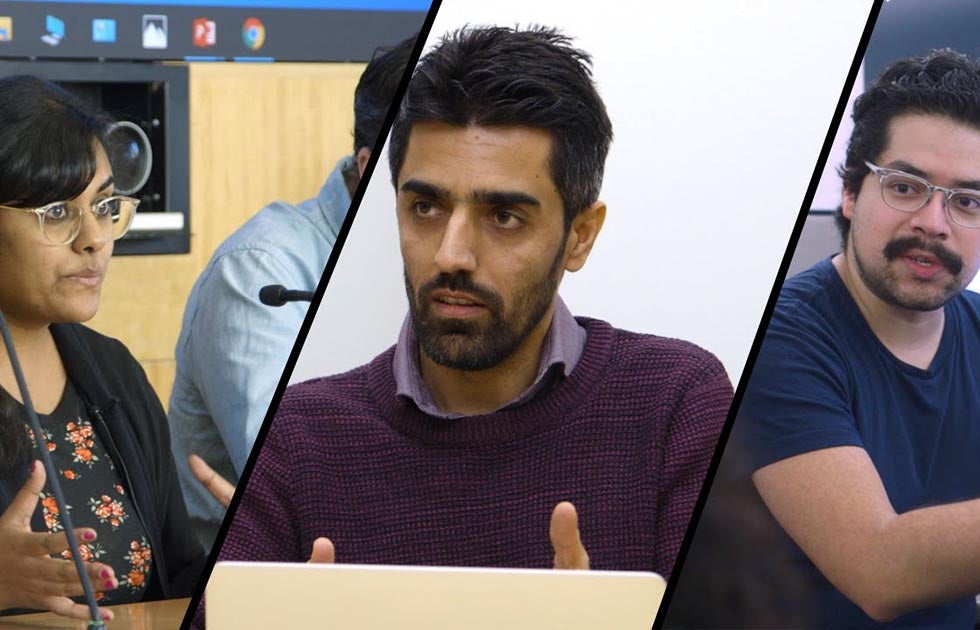
What is it like to be a Ph.D. student? We followed five of our students through their daily activities.
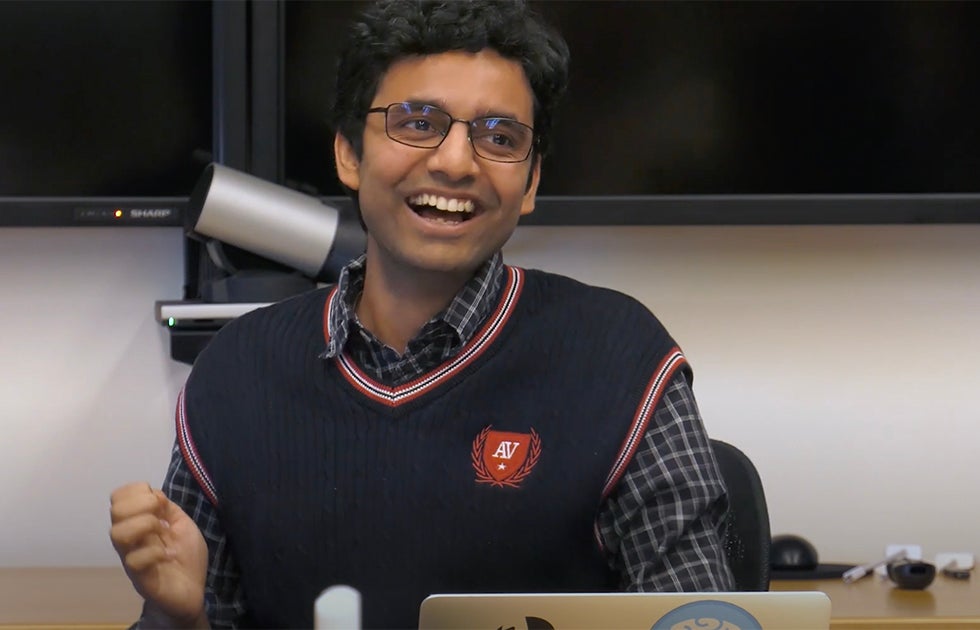
Prateekshit Pandey works with the Communication Neuroscience Lab to study how the brain reacts to humor.
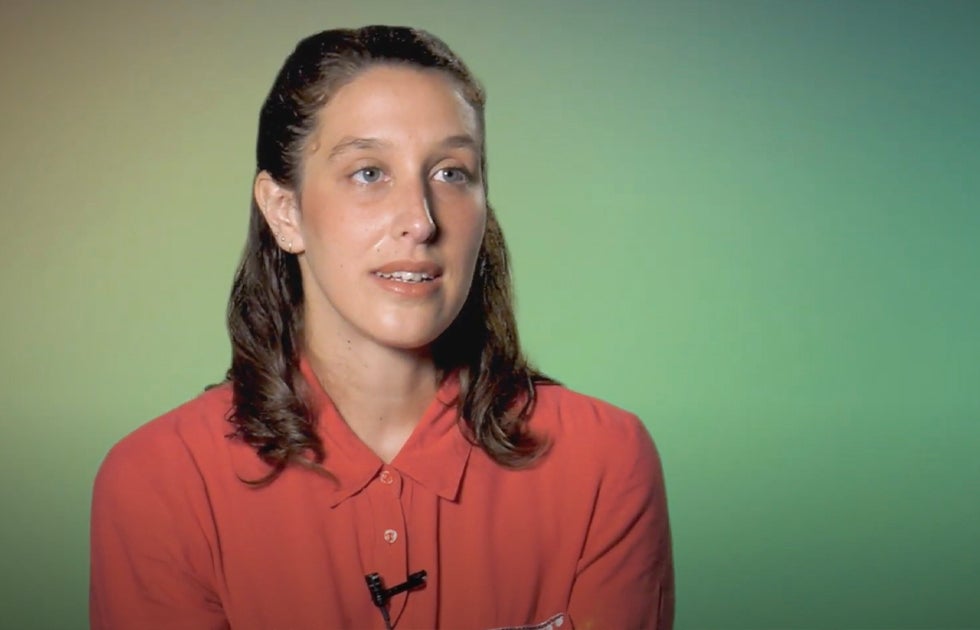
Buenos Aires-native María Celeste Wagner looks at how gender influences credibility in news.
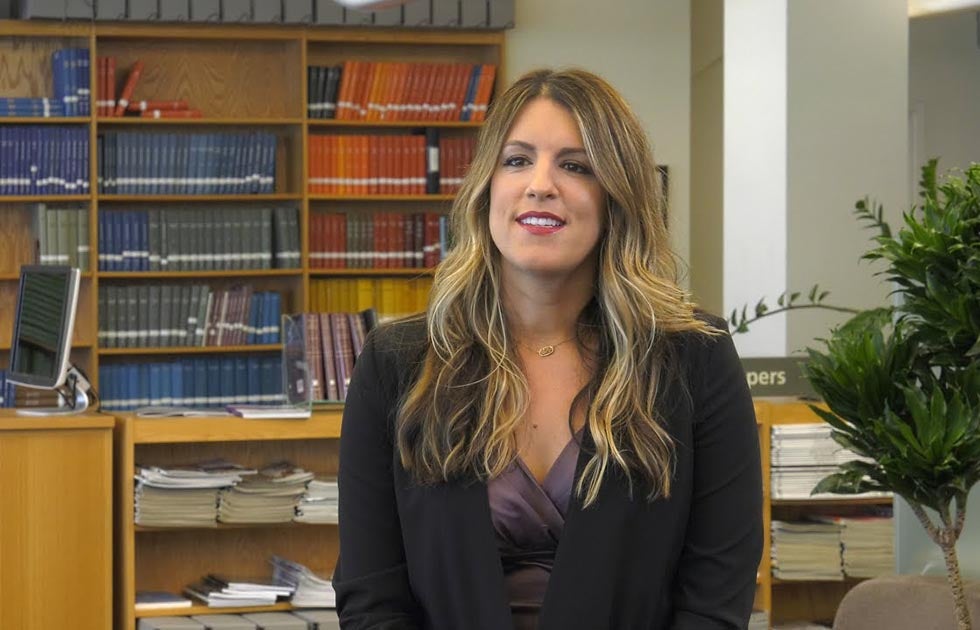
Jennifer Henrichsen studies the way that journalists adopt information security technologies to protect themselves and their sources.
Our Students
Annenberg's doctoral students represent a broad spectrum of interests, methodologies, and backgrounds. Here are just a few of our incredible students.
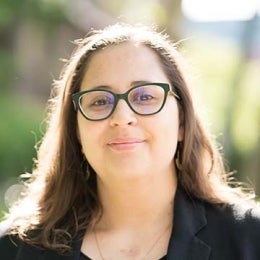
Arlene C. Fernández
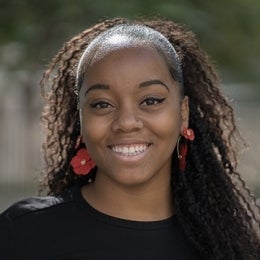
Azsaneé Truss

Antoine Haywood
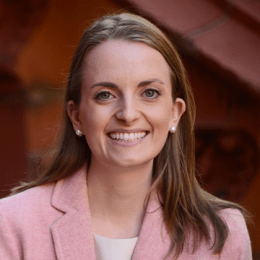
Danielle Clark
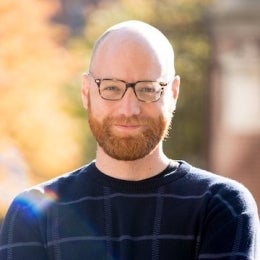
Neil Fasching

Tom W. Etienne

Adetobi Moses Awarded 2024 Penn Global Dissertation Grant
Penn Global has announced that Annenberg School doctoral candidate Adetobi Moses is an awardee of its newly established Penn Global Dissertation Grants program. The program provides support to Penn Ph...
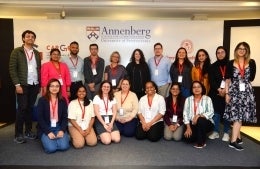
From Philly to Delhi: the Inaugural Global Media Cultures International Doctoral Institute
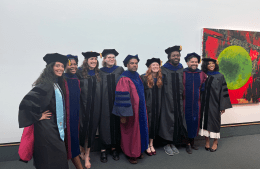
Congratulations to Annenberg’s 2024 Ph.D. and M.A. Graduates
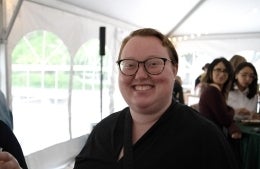
Student Profile Video: Kate Okker-Edging

Proust, Smith, and Truss Win 2024 James D. Woods Award

Explore the Program
Learn more about life in the Annenberg Ph.D. program.

Financial Support

Curriculum & Milestones

Student Life

Applications for 2025-2026 will open by October
More in doctorate in communication.
| You might be using an unsupported or outdated browser. To get the best possible experience please use the latest version of Chrome, Firefox, Safari, or Microsoft Edge to view this website. |
10 Careers In Communications You Should Consider

Updated: Mar 26, 2024, 8:02am

A communications degree can prepare you for many career paths, including editor, public relations specialist , writer and social media manager. The communications field is broad, encompassing jobs in journalism , business roles and marketing careers , among other professions.
As a communications professional, your role and daily tasks can vary significantly. You might write press releases, create digital content strategies, interview people or work on brand awareness campaigns. You could also plan social media campaigns, write novels, research market trends or report the news.
Even if you do not end up in a traditional communications career, strong communication skills can serve you in nearly any role. Keep reading to learn about some of the best careers in communications.
Keep reading to learn about some of the best careers in communications.
Why You Can Trust Forbes Advisor Education
Forbes Advisor’s education editors are committed to producing unbiased rankings and informative articles covering online colleges, tech bootcamps and career paths. Our ranking methodologies use data from the National Center for Education Statistics , education providers, and reputable educational and professional organizations. An advisory board of educators and other subject matter experts reviews and verifies our content to bring you trustworthy, up-to-date information. Advertisers do not influence our rankings or editorial content.
- 6,290 accredited, nonprofit colleges and universities analyzed nationwide
- 52 reputable tech bootcamp providers evaluated for our rankings
- All content is fact-checked and updated on an annual basis
- Rankings undergo five rounds of fact-checking
- Only 7.12% of all colleges, universities and bootcamp providers we consider are awarded
What Is Communications?
Communications professionals use mediums like text, speech, images and video to tell stories and convey information and messages. In February 2024, communication topped LinkedIn’s list of the year’s most in-demand skills.
Communications draws from diverse fields, including marketing, public relations, journalism and business. Careers in communications span multiple sectors, including roles like public relations specialist, reporter, marketing specialist and communications director.
The job outlook for communications professionals appears stable. The Bureau of Labor Statistics (BLS) projects average growth for media and communication occupations from 2022 to 2032, with about 114,300 job openings projected per year. Some communications roles, particularly those in marketing and management, will likely experience faster-than-average job growth.
Most entry-level communications jobs require a bachelor’s degree in communications or a related field. Communications programs develop skills in public speaking, writing, research and teamwork. Communications majors may pursue general degrees or choose a concentration in journalism, public relations, writing or a related subject. Learn about more communications specializations in the next section.
Communications Specializations
Which jobs you can get with a communications degree depends on several factors, including your education, experience and specialization area. Explore some of the specializations you can pursue within the communications field below.
- Marketing communications. If you specialize in marketing communication, you use marketing tools and strategies to reach consumers and meet business goals.
- Social and digital media. This specialization uses social and digital media tools and strategies to influence and communicate information to consumers.
- Public relations. Communications professionals who specialize in public relations work on an organization’s behalf to present a favorable brand image to the media and public.
- Journalism. Journalism communicates news and information to the public via newspapers, television, websites, radio and magazines. This field requires writing, speaking, interviewing and research skills.
- Writing and publishing. A writing and publishing specialization may lead you to work as a copywriter, content writer or publishing assistant. Writing skills can also serve you in many other roles beyond these.
- Health communications. Some communications professionals specialize in communicating health and healthcare information.
- Business communications. This specialization helps businesses communicate their messages internally and externally. Speaking, writing, research and interpersonal skills are key.
What Can You Do With a Communications Degree?
A communications degree can help you pursue various careers in communications. Eligibility for the jobs below depends on your education level, experience and specialization. Learn about some of the best careers in communication, including salary expectations and typical job tasks.
The below salary data comes from the BLS and Payscale .
Communications Directors
Average Annual Salary: Around $89,000 Minimum Required Education: Bachelor’s degree Job Overview: Acting as a spokesperson for their employing organization, a communications director oversees media relations and helps their organization maintain a positive image. Typical duties include community outreach, managing marketing employees and creating press releases. Working in all industries, communications directors minimize negative publicity and respond to crises.
Public Relations Specialists
Median Annual Salary: $67,440 Minimum Required Education: Bachelor’s degree Job Overview: Public relations specialists , also called communications specialists, help their clients get good publicity and avoid bad publicity to create or maintain a positive public image. They work for individuals, companies, nonprofit groups and government agencies. Duties include responding to media requests for information, writing speeches and assessing public opinion of their clients.
News Analysts, Reporters and Journalists
Median Annual Salary: $55,960 Minimum Required Education: Bachelor’s degree Job Overview: News analysts, reporters and journalists inform the public about relevant news and information. They report on local, national and international stories that appear on radio, on television, in newspapers, in magazines or online. These professionals research, write and brainstorm ideas for stories, requiring good communication, interpersonal and technological skills.
Median Annual Salary: $73,080 Minimum Required Education: Bachelor’s degree Job Overview: Editors work on publications like books, magazines, newspapers and websites. They review and edit content, verify facts, make editorial calendars and work with writers on assignments. Copy editors, managing editors and publication assistants are all types of editors.
Writers and Authors
Median Annual Salary: $73,150 Minimum Required Education: Bachelor’s degree Job Overview: Writers and authors create written content for media like books, magazines, television shows and movies. Common types of writers include copywriters, novelists, content writers and speechwriters. Most writers and authors are self-employed.
Market Research Analysts
Median Annual Salary: $68,230 Minimum Required Education: Bachelor’s degree Job Overview: Market research analysts help companies figure out what types of products and services people want to buy. They research sales trends, conduct consumer research, write reports and present their findings. Market research analysts need strong communication, analytical and critical thinking skills.
Marketing Managers
Median Annual Salary: $140,040 Minimum Required Education: Bachelor’s degree Job Overview: Marketing managers , and specifically marketing communications managers, oversee the marketing for businesses and/or brands. They create marketing plans and strategies, develop advertising campaigns, manage other marketing employees and assess the competition. Marketing communications managers need good leadership, communication and business skills.
Social Media Managers
Average Annual Salary: Around $57,000 Minimum Required Education: Bachelor’s degree Job Overview: Social media managers help their organizations or clients manage their social media presence. This includes creating social media content, developing a social media strategy, responding to customers on social media platforms and assessing social media analytics. Social media managers need good communication, management and marketing skills. To learn more, see our guide on how to become a social media manager .
Human Resources Managers
Median Annual Salary: $130,000 Minimum Required Education: Bachelor’s degree Job Overview: Human resources (HR) managers oversee an organization’s personnel-related administrative aspects. They recruit, hire, train and discipline employees; coordinate employee benefits programs; and intermediate between an organization’s management and the rest of the workforce. Many types of HR managers exist, including payroll managers, staffing managers and employee relations managers. Learn more in our guide on how to become an HR manager .
Broadcast Announcers and Radio DJs
Median Annual Salary: $41,750 Minimum Required Education: Varies, but a bachelor’s degree is a common requirement Job Overview: Announcers appear on TV and the radio to present news and other information. DJs emcee and play music at parties and other events. Job duties include interviewing people, appearing at events and reading scripts. Announcers and DJs benefit from strong speaking, writing, interpersonal and research skills.
Professional Organizations for Communications
Communications professionals can seek support, resources and continuing education opportunities through the following organizations.
National Communication Association (NCA)
NCA promotes and does advocacy work on behalf of the communications profession. The membership organization publishes academic journals, organizes an annual convention and manages an online career center.
Association for Women in Communications (AWC)
AWC promotes women in communications. Membership benefits include access to networking events, professional development, job resources, and writing and leadership opportunities.
Public Relations Society of America (PRSA)
A global membership organization for communications and public relations professionals, PRSA offers professional development opportunities, networking events and opportunities to hone members’ leadership skills. The group also advocates for the profession and maintains a professional code of ethics.
Frequently Asked Questions (FAQs) About Careers in Communications
What can you become when you study communications.
Earning a communications degree does not guarantee any particular job, but it can prepare you for various careers in communications, including communications director, social media manager, editor and public relations specialist. You may also choose a career outside of communications but still take advantage of the communications skills you learned while studying the discipline.
Is communication studies a good degree?
Yes, it can be, depending on what you want to do after graduation. A communication studies degree can prepare you for roles like journalist, writer, public relations specialist or market research specialist. Earning a communication degree can also help you hone your communication abilities, an in-demand skill in pretty much every industry.
What are fields in communications?
Communications fields include public relations, marketing, mass media, and writing and publishing. Professionals with communications backgrounds also work in education, business, social media and healthcare.
- Best Online Accounting Degrees
- Best MBA In Finance Online
- Best Online Finance Degrees
- Best Online Master’s In Accounting Degrees
- Best Online Master’s In Finance
- Best Online MBA Programs
- Best Ph.D. In Leadership Online Programs
- How To Become A CPA
- How To Become A Financial Advisor
- How To Become An Accountant
- How To Become An Investment Banker
- Possible Jobs With A Business Management Degree
- How To Choose A Career In Marketing
- What Can You Do With An Accounting Degree?
- Alternatives To An MBA
- Earning A Business Administration Bachelor’s Degree
- Earning A Bachelor’s In Marketing
- Bookkeeping vs Accounting
- Should You Get An MBA In Finance?
- Earning A Finance Degree
- Earning An Online MBA In Accounting

How To Become A Real Estate Agent: Job Outlook And Certifications
Best Online M.B.A. Accelerated Programs Of 2024
Best Online Associate Degrees In Business Management Of 2024
Where To Earn An Online Ph.D. In Marketing In 2024

Best Online Ph.D. In Management Of 2024
Liz Simmons has been writing for various online publications about career development, higher education and college affordability for nearly a decade. Her articles demystify the college application process and help prospective students figure out how to choose a major or career path.
- Interesting for you
- My settings
Go to your profile page to get personalised recommendations!
Some of the content on this website requires JavaScript to be enabled in your web browser to function as intended. This includes, but is not limited to: navigation, video, image galleries, etc. While the website is still usable without JavaScript, it should be enabled to enjoy the full interactive experience.

- About the School of Communication
- Undergraduate Programs
- Graduate Programs
- Undergraduate Advising
- Student Groups & Organizations
- Internships and Independent Study
- Presidential Studies Program
- Center for Demographics and Policy
- Careers and Connections
- Faculty Directory
- Support the School of Communication
» Ph.D. in Communication
If you’re driven to pursue research and to empower the next generation of impactful communicators, Chapman University’s Ph.D. in Communication program will prepare you to lead. Here, you’ll develop your own research identity as you explore options aided by a supportive community built on mentorship and collaboration. You’ll gain extensive knowledge of communication processes grounded in both quantitative and qualitative approaches to research and teaching.
The Chapman Ph.D. program offers three principal areas of emphasis:
- Interpersonal Communication
- Health Communication
- Media and Communication Technology
If you choose to focus on other sub-disciplines in Communication, faculty mentors are eager to help guide your specialty research pursuits, including in:
- Family Communication
- Instructional Communication
- Intercultural Communication
Our Students and Alumni
Here are some of the employers who have hired graduates with a Chapman Ph.D. in Communication:
- U.S. Centers for Disease Control and Prevention
- Planned Parenthood
- UCLA Health
- Orange County United Way
- Clemson University
- Lighthouse Health and Wellness
- Concordia University Irvine

Sampling of Faculty-Student Research
- Digital Flourishing: Conceptualizing and Assessing Positive Perceptions of Mediated Social Interactions by Dr. Sophie H. Janicke-Bowles , Tess M. Buckley (Ph.D. ’22) , Rikishi Rey (Ph.D. ’22) , Tayah Wozniak (Ph.D. ’22) , Adrian Meier & Anna Lomanowska
Understanding First Responders’ Perspectives of Mental Health Communication within Their Departments by Erin Craw (Ph.D. ’22) and Dr. Michelle Miller-Day
“Like Being Deployed to War”: Stress and Resilience in Frontline Nurses During the COVID-19 Pandemic by Erin Craw (Ph.D. ’22) , Tess Buckley (Ph.D. ’22) , and Dr. Michelle Miller-Day
The impact of HPV vaccine narratives on social media: Testing Narrative Engagement Theory with a diverse sample of young adults by Leader, A., Dr. Michelle Miller-Day , Rikishi Rey (Ph.D. ’22), Selvan, P., Pezalla, A., & Hecht, M.L
“This isn’t just busy, this is scary”: Stress, Social Support, and Coping Experiences of Frontline Nurses during the COVID-19 Pandemic by Erin Craw (Ph.D. ’22) , Tess Buckley (Ph.D. ’22) , and Dr. Michelle Miller-Day
Men’s stories: an account of translating vaccine decision narratives from young men in the US into a targeted public health intervention by Erin Craw (Ph.D. ’22) and Dr. Michelle Miller-Day
- Ambiguous loss, stress, communal coping, and resilience: A mixed- methods study of K-12 teachers’ experiences during the COVID-19 pandemic by Erin Craw (Ph.D. ’22) and Dr. Jennifer Bevan
Extending Psychological Reactance Theory to Include Denial of Threat and Media Sharing Intentions as Freedom Restoration Behavior by Noel H. McGuire (Ph.D. Candidate ’24) & Dr. Hannah Ball
- Shot Talk: Development and Pilot Test of a Theory of Planned Behavior Campaign to Combat College Student COVID-19 Vaccine Hesitancy by Dr. Hannah Ball , Tayah Wozniak (Ph.D. '22) , & Cailin M. Kuchenbecker (Ph.D. Candidate ’24)
Coursework & Credit Requirements
Full-time students coming into the program with a Master’s degree will need to complete a minimum of 36 credit hours of coursework and are expected to graduate within three years. Additionally, students will register for up to 18 hours of research during their third year in the program. Thus, students entering with a Master’s degree, or the equivalent, must complete a minimum of 54 total credit hours.
Students admitted without a master’s degree will need to complete the Health and Strategic Communication master’s degree as an integral part of the Communication Ph.D. program, in addition to the doctoral work. Thus, students entering without a Master’s degree, or the equivalent, must complete a minimum of 66 credit hours of coursework in addition to 18 credit hours of research.
Area of Emphasis
Our Ph.D. program has 3 Areas of Emphasis (AoE). These AoE’s mirror the specialties of the current faculty: Interpersonal Communication, Health Communication, and Media and Communication Technology.
- Interpersonal Communication: Involves the study of both the processes and effects of social interaction. Communication in personal and family relationships are two important contexts in which interpersonal theories are applied.
- Health Communication: Health communication is a multidisciplinary field of study and practice that applies communication evidence, strategy, theory, and creativity to promote behaviors, policies, and practices that advance the health and well-being of people and populations.
- Media and Communication Technology : Deals with the content, history and effects of various media, including mass media, and new communication technologies (i.e., social media, digital media)
Program Timeline
- Student Enters the Program
- Formal Advisor Chosen
- Complete Committee
Summer Semester Y2
- Completes Comps or Preliminary Papers
- Complete Coursework
- Prospectus Defense
- Dissertation credits
- Dissertation
Required Coursework
Coursework requirements have been organized into five separate areas. The first is the Core Theory Courses, followed by Core Methods/Stats classes, Electives in Primary Area, Electives in Secondary Area, as well as Dissertation and Research.
All students will take one (1) Core Communication Theory course (COM 700). Students will take an additional two (2) Core Theory courses (6 credit hours). These two courses will be representative of the student’s primary and secondary areas of emphasis.
Students will declare a primary area of emphasis no later than the beginning of the second semester of their program. Similarly, students will declare a secondary area of emphasis no later than the beginning of their third full semester in the program (summer and interterm semesters do not count as full semesters).
Students will take a minimum of four (4) Research Methods/Statistics courses (12 credit hours). All students will take Introduction to Research Methods (HCOM595), Quantitative Research Methods (COM695), and Qualitative Research Methods (COM696). Students must then choose one additional research methods course based upon their research interests and discussion with their Dissertation Advisor.
Area 1. Core Theory Courses (Area Credits = 9; Total credits = 9)
- Communication Theory (COM 700)
- Theories of Health Communication (HCOM 580)
- Theories of Interpersonal Communication (HCOM 570)
- Mass Communication Theory (COM 571)
- Organizational Communication (COM 572)
- Courses listed above
- Qualitative Research Methods (COM 696)
- Quantitative Research Methods (COM 695)
- Advanced Quantitative Methods (COM 795)
- Multivariate Research Methods (COM 797) OR Advanced Qualitative Research Methods (COM 796)
Area 3. Electives in Primary Area (Area Credits = 12; Total credits = 30)
Courses listed for Area 1 requirements can be double counted to fulfill Area 2 requirements but can only be counted once toward the 36 credit hour requirement.
With approval of the Ph.D. Director, up to 6 credit hours of coursework from the student’s master’s degree can be applied toward fulfillment of the Ph.D. in Communication. Area 4. Electives in Secondary Area (Area Credits = 9; Total credits = 36)
Courses listed for Area 1 requirements can be double counted to fulfill Area 4 requirements but can only be counted once toward the 36 credit requirement.
With approval of the Ph.D. Director, up to 6 credit hours of coursework from the student’s master’s degree can be applied toward fulfillment of the Ph.D. in Communication. Area 5. Dissertation Proposal and Research (Area Credits = 18; Total credits = 54)
Application Requirements and Deadlines
- A bachelor's degree and/or master's degree from accredited institutions. Official transcripts must be submitted from all degree-granting (bachelor's and master's degrees) colleges and universities attended.*
- 3.000 is the minimum recommended undergraduate and graduate cumulative grade point averages.
- Two letters of recommendation are required, including one from an academic source (i.e., graduate-level professor) who can describe academic and professional abilities.
- 2-4 page personal statement addressing interest in the Ph.D. in Communication at Chapman University, research and career goals.
- Writing sample from previous academic coursework or paper submitted to academic conference or publication (10-12 page minimum requirement).
- Current curriculum vitae showing relevant education, research, publications, grants, coursework, teaching experience, work experience.
- Verbal: 152
- Quantitative: 146
- Analytical Writing: 4.0
- Interview with Graduate Director or Graduate Coordinator
* If a student is admitted without an approved M.A./M.S. degree in Communication or related field, students will need to complete the M.S. degree program first, prior to beginning their doctoral work.
Application Deadlines
Early decision applications are due January 15th. Applications received after January 15th will be considered on a space available basis. All other applications must be submitted by March 15th. Because the number of students is limited, meeting the following minimum requirements does not guarantee admission.
Our Students
Tess Buckley '22: Read More
Erin Craw '22: Read More
Rikishi Rey '22: Read More
Tayah Wozniak '22: Read More
Information Sheet
- MS in Health & Strategic Communication
- Ph.D. in Communication
- Graduate Application
- Financial Aid
- Admission Deadlines
- Information Sessions
PhD in Communication
We are an international, interdisciplinary, boundary-spanning graduate program with a vision of social justice.
The emergence of communication as a multifaceted social science discipline is connected to both the search for new perspectives on contemporary problems and the profusion of technologies of communication. Our graduate program approaches communication as the primary social process through which social realities are constituted, maintained, and changed. Those varied processes and contexts constitute the core of our work, with opportunities to pursue communication theory and research in the following areas:
- Film studies
- Media effects and popular culture
- Media, technology, and society
- Rhetoric and performance studies
- Social interaction and culture
Our doctoral program is known for its:
- R1-level research productivity
- Interdisciplinary, boundary-spanning scholarship
- Social justice perspective
- Comparative and international focus
Application information & deadlines
January 2, 2024, communication.
Treat communication as a primary social process and gain knowledge of communication theory, philosophy, methodology, and research.
Global footer
- ©2024 University of Massachusetts Amherst
- Site policies
- Non-discrimination notice
- Accessibility
- Terms of use
This site requires JavaScript to work properly.
How do i activate javascript in this web browser.
- Event Registration
Department of Biomedical Engineering
- Event Online Registration
- DBE Course Catalogue
- Master of Science
- PhD Program
- Biomaterials Science and Regenerative Medicine
- Clinical Biomechanics
- Data Driven Modelling and Analysis
- Emerging Analytical and Forensic Technologies
- Lasers & Robotics
- Medical Imaging
- Flagship Project MIRACLE
- Core Facilities
- All Research Groups
- Collaboration
- Material about the DBE
- Organisation
- Contact and Directions
- History of the DBE
- First Encounter
01 July 2024
DBE PhD Day on Science Communication

The 24th of May was a very special day at the DBE with our PhD Day. Together with 30 of our fellows from various research groups, we had the opportunity to network in a relaxed atmosphere – just the right way to get creative!
Welcomed by Prof. Dr. Phillipe Cattin, we started into the day with games to get to know each other. In a workshop about "Science Communication", Dr. Eisha Mhatre (scientist, scientific writer, and founder of the scientific communication platform The Experimentalist and Jana Tischer from the Science Slam Club of Basel presented some techniques to communicate science to the general public. In a second workshop, Anna Wirz from the New Media Center of the University of Basel gave important pointers on research video making. She also presented the resources to produce a research video at the university's media center.
In the afternoon, our participants saved the world in a DBE custom-made escape game. Navigating through the four different puzzles put their problem-solving skills and teamwork to a test. After two intense hours, all teams could solve the riddle, Congratulations! The event continued with inspiring talks by DBE-alumni Eva Schnider, Griffin Rodgers and Sandra Drusová. Their stories and advice provided valuable guidance and motivation for the current PhD students.
We concluded the event in the evening with a delicious BBQ and cheerful music.
- The DBE PhD Program
Quick Links
- » University of Basel
- » University Hospital Basel
- » University Children’s Hospital
- » Intranet (only for DBE members)
- » Emergency Contacts
- » DBE Contact
Social Media
- © University of Basel
- Privacy Policy

IMAGES
VIDEO
COMMENTS
Teaching lends itself to public speaking and presentation experience. Student engagement signals your interpersonal and management skills. A PhD in Communication is not a magic wand, but it can conjure up the skills and abilities to take you where you want to go. So, think big and broad. Ask yourself what you want and see how the degree can ...
Quick Highlights: Our #1 ranked school for a PhD in communications is Temple University, followed by Purdue University. These programs prepare students for advanced careers in academia, research, and various industries. Many programs offer interdisciplinary study options, allowing students to combine communications with other fields.
Individuals with a PhD in Communications may pursue the following careers: 1. Professor/Researcher: Many PhDs in Communications pursue professions in academia as professors or researchers. They can teach and do research in communication departments at universities and colleges, as well as write academic articles and books and contribute to the ...
Theory and Research Ph.D. The Ph.D. program prepares students to conduct original research on communication processes, their origins, and their psychological, political and cultural effects. Most of our doctoral graduates enter academic teaching and research careers, or communication-related professions that require research skills.
A PhD program focuses on developing an area of research expertise and prepares a person for a career as a professor, researcher, or administrator—often in an academic setting. The job outlook for faculty in communication sciences and disorders (CSD) is positive, with a high demand for both new and experienced faculty in the discipline.
The Doctor of Philosophy degree in Communications offers a multidisciplinary approach to the study of the relationships between people and media in their cultural, social, political, historical, economic and technological contexts. With the guidance of an interdisciplinary faculty advisory committee, students craft i ndividual courses of study ...
It costs an average of $19,314 per year to get a PhD in Communication. Tuition costs differ between public and private universities, as well as for in-state and out-of-state residents. Public universities are estimated to have $12,171 for graduate tuition while attending private universities costs $25,929.
Through instruction in research methodologies and communication theory, the Ph.D. in Communication teaches students to analyze the complex interactions between those institutions - whether the news media or government. With that skill set and knowledge, graduates are prepared to pursue careers in academia as professors and researchers, but ...
The doctoral degree in communication is research-intensive and will prepare you for a career in academia or other research-oriented professions. You will specialize in one or more of the following areas: Communication, Politics and Policy. Health Communication. Organizational Communication. Media, Culture and Identity. Rhetoric and Public Affairs.
Robert Morris University offers an online PhD in Information Systems and Communications program. Students must complete 60 credit hours, with 12 dedicated to writing a dissertation. At the end of each school year, students must finish a milestone. Applicants must have a GPA of 3.0 and submit 3 letters of recommendation.
school for studying communication and media in the U.S. In 2021, QS World University Rankings named USC Annenberg among the foremost schools for studying communication and media in the world. 14. doctoral candidates in our 2023 cohort Our small cohorts create an intimate group of contemporary researchers with whom to study.
Applicants for the Communication (PhD) degree program must hold an accredited bachelor's degree and a master's degree in communication, or a related field, with a cumulative GPA of 3.30 or higher, unless the applicant demonstrates comparable experience. The degree does not have to be in the field of communication or be research-based, as many ...
Most of our Ph.D. students enter academic careers following graduation, although some enter various communication industries and use their research skills in marketing, polling, media or other industries. For more information, contact the Graduate Program Coordinator by email at [email protected] or call (614) 292-6503.
The best online PhD program in communication is the PhD in Media and Communication offered by Indiana State University, which provides a flexible learning method. Designed for part-time and full-time students, this program only takes three years to complete at most and offers its students plenty of hands-on experience through its online courses.
Founded through the generosity and vision of publisher, diplomat, and philanthropist Walter Annenberg, the Annenberg School for Communication is devoted to furthering our understanding of the role of communication in public life through research, education, and service. Our five-year doctoral program has a strong reputation as one of the best ...
Getty. A communications degree can prepare you for many career paths, including editor, public relations specialist, writer and social media manager. The communications field is broad ...
The Ph.D. degree in Communication and Information from Kent State University prepares individuals for traditional and emerging careers in teaching, research and administration in the converging fields of communication and information. Ph.D. / Full-time / On Campus. Kent State University Kent, Ohio, United States. Ranked top 6%.
The Chapman Ph.D. program offers three principal areas of emphasis: Interpersonal Communication. Health Communication. Media and Communication Technology. If you choose to focus on other sub-disciplines in Communication, faculty mentors are eager to help guide your specialty research pursuits, including in: Family Communication.
The doctoral degree (PhD) program in Communication, Culture and Media offers students the opportunity to become experts in a variety of compelling topics, such as: Political communication (especially war and conflict) Media treatment of immigration and immigrants. Consumer culture and culture change under commodification of the self.
Professor or assistant professor. Public relations director. Communication researcher. Technical writer. Communication director. Content strategist. Professor Muriel E. Scott earned her PhD at UAlbany and is now an associate professor in the Department of Mass Communication at Winona State University in Minnesota.
PhD in Communication. Apply now. We are an international, interdisciplinary, boundary-spanning graduate program with a vision of social justice. The emergence of communication as a multifaceted social science discipline is connected to both the search for new perspectives on contemporary problems and the profusion of technologies of communication.
Communication plays a fundamental role in our global society and it is imperative for us to recognize and appreciate the international and intercultural contexts in which it occurs. With a Ph.D. in Communication from UND, you'll learn about human communication across diverse cultures and through multiple systems. Program type: Doctoral Degree.
You can gain a richer understanding by discussing with faculty members and doctoral students how their special interests may relate to your own. We encourage you to do that, either through a phone call or a personal visit to the Illinois campus. Office location: 119 Gregory Hall, 810 S. Wright St., Urbana, IL Phone: 217-333-1549.
You can deploy skills you develop as a grad student and postdoc in a variety of careers, including working for a start-up or founding your own, Chris Smith writes. Innovation has become a hot topic in economic circles over the past few years. In March 2022, the United States' National Science Foundation created its first new directorate in over 30 years: Technology, Innovation and ...
DBE PhD Day on Science Communication. The 24th of May was a very special day at the DBE with our PhD Day. Together with 30 of our fellows from various research groups, we had the opportunity to network in a relaxed atmosphere - just the right way to get creative! ... In a workshop about "Science Communication", Dr. Eisha Mhatre (scientist ...